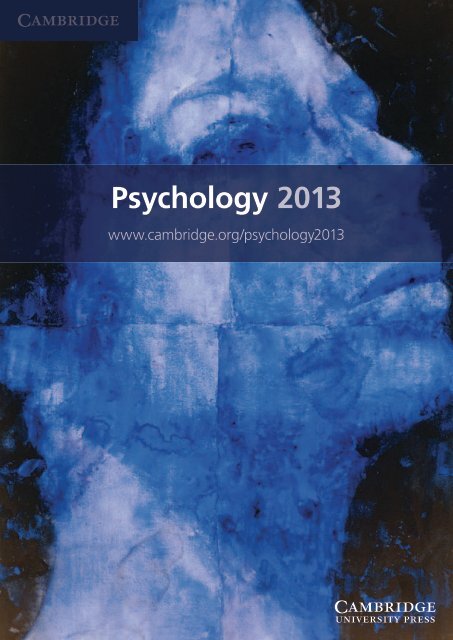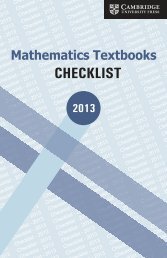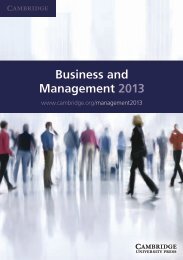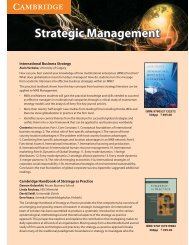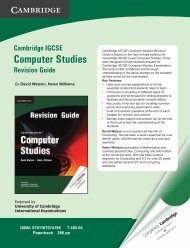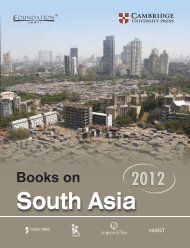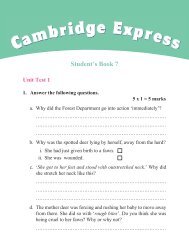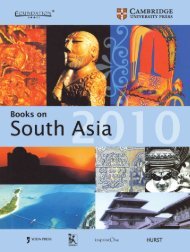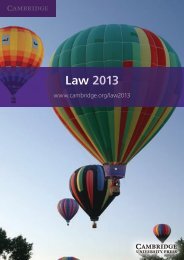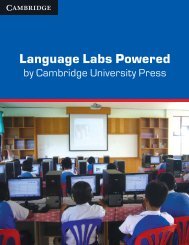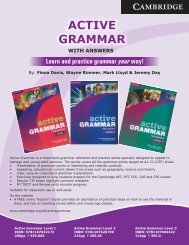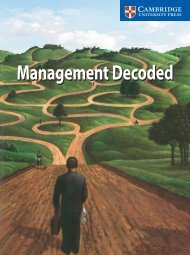Psychology 2013 - Cambridge University Press India
Psychology 2013 - Cambridge University Press India
Psychology 2013 - Cambridge University Press India
Create successful ePaper yourself
Turn your PDF publications into a flip-book with our unique Google optimized e-Paper software.
<strong>Psychology</strong> <strong>2013</strong><br />
www.cambridge.org/psychology<strong>2013</strong>
Aberystwyth <strong>University</strong><br />
Sheffield Hallam <strong>University</strong><br />
Cover illustration: © SambaPhoto /<br />
Andre Arruda / Getty Images.<br />
Contents<br />
Cognition 1<br />
Social psychology 3<br />
Developmental psychology 5<br />
Educational psychology 8<br />
Health and clinical psychology 9<br />
Personality and individual<br />
differences 11<br />
Applied psychology 12<br />
Biological psychology 12<br />
History of psychology 13<br />
<strong>Psychology</strong> research<br />
methods/statistics 13<br />
Cultural psychology 13<br />
<strong>Psychology</strong> (general) 14<br />
Information on related<br />
journals Inside back cover<br />
Highlights<br />
Peter Lamont<br />
Extraordinary<br />
Levels of Personality is an established and ‘Interesting<br />
Beliefs<br />
much-acclaimed textbook for students studying and informative<br />
psychology courses in personality and individual … illustrates the<br />
differences. This updated edition includes new uses of psychology<br />
in-chapter features that make statistics and clinical in the real world<br />
assessment easier to understand. Theories come<br />
providing relevance<br />
and validity for<br />
together in a conceptual framework that offers an<br />
students.’<br />
understanding of personality that moves beyond<br />
kate bullen<br />
the ‘surface level’. For example, coverage of trait<br />
a Historical approach to a<br />
and factor approaches is enhanced by analysing<br />
Psychological learning, self and motivational Problem approaches to ‘Cook’s writing<br />
give you a uniquely comprehensive account of the style is engaging<br />
subject. Case studies apply what you have learnt to and fluid … there<br />
areas of special interest such as aggression is a truly excellent<br />
and sexuality. level of evaluation<br />
of key theories<br />
that will encourage<br />
new to this edition: students to critically<br />
• the latest theories and research in personality analyse theories<br />
and evidence in<br />
• two new chapters on personality disorders and<br />
personality in the workplace greater depth.’<br />
davId bowles<br />
• revised features including statistics and<br />
assessment boxes, key websites and<br />
references for each chapter aid<br />
understanding and further reading<br />
Cook 9781107605404 Cover. C M Y K<br />
➤ See page 1<br />
Are We Getting<br />
SMARTER<br />
Rising IQ in the Twenty-First Century<br />
James R. Flynn<br />
Cook LeveLs of personaLity<br />
t h I rd edI t I on<br />
LeveLs of<br />
personaLity<br />
thIrd edI t Ion<br />
Mark Cook<br />
➤ See page 11<br />
THE CAMBRIDGE HANDBOOK OF<br />
Psycholinguistics<br />
EDITED BY<br />
Michael J. Spivey<br />
Ken McRae<br />
Marc F. Joanisse<br />
➤ See page 11<br />
➤ See page 3<br />
This catalogue contains a selection of our most recent publishing in this area. Please visit our<br />
website for a full and searchable listing of all our titles in print and also an extensive range of<br />
news, features and resources. Our online ordering service is secure and easy to use.<br />
Useful contacts<br />
Book proposals: Hetty Marx (hmarx@cambridge.org)<br />
Further information about <strong>Psychology</strong> titles: Hannah Daldry (hdaldry@cambridge.org)<br />
All other enquiries: telephone +44 (0) 1223 312393 or email information@cambridge.org<br />
Prices and publication dates are correct at the time of going to press but are subject to alteration without notice.<br />
<strong>Cambridge</strong> Alerts<br />
and receive<br />
15%<br />
off your next<br />
online purchase<br />
Receive free regular and<br />
relevant emails about new<br />
books, special offers and<br />
events in your subject<br />
www.cambridge.org/camalert
Journals in <strong>Psychology</strong><br />
and Psychotherapy<br />
Covering areas including behavioural and cognitive therapy,<br />
rehabilitation counselling, guidance counselling, educational psychology,<br />
developmental psychology and brain sciences.<br />
journals.cambridge.org/psych
Available for<br />
institutional purchase<br />
CAMBRIDGE BOOKS ONLINE<br />
<strong>Cambridge</strong> <strong>University</strong> <strong>Press</strong><br />
<strong>Psychology</strong> eBook<br />
Collection<br />
Over 700 <strong>Psychology</strong> eBooks available<br />
View the full list:<br />
www.cambridge.org/cbopsychology<br />
Benefits for users<br />
1 Log in from your home PC, laptop or iPad<br />
with remote user access<br />
1 Download and print individual chapters in PDF<br />
1 Export citations in MLA style for quick and<br />
accurate referencing<br />
1 Stay up to date with RSS feeds for saved<br />
searches and new content alerts<br />
Benefits for your library<br />
1 Choose from a range of front and backlist<br />
titles, with new content added every month<br />
1 Select predefined or bespoke collections for<br />
maximum flexibility (25 books minimum order)<br />
1 Get comprehensive library support tools,<br />
including: downloadable MARC records, usage<br />
reports, and access to authentication methods<br />
Ask your librarian to request a free trial – www.universitypublishingonline.org/trial<br />
<strong>University</strong> Publishing Online provides institutional access to content<br />
from the world-renowned publishing programmes of <strong>Cambridge</strong> <strong>University</strong> <strong>Press</strong>,<br />
plus an expanding range of partner presses, including: Anthem <strong>Press</strong>, Foundation Books,<br />
Liverpool <strong>University</strong> <strong>Press</strong>, Nottingham <strong>University</strong> <strong>Press</strong>, <strong>University</strong> of Adelaide <strong>Press</strong>,<br />
Edinburgh <strong>University</strong> <strong>Press</strong> and Boydell & Brewer.<br />
<strong>Cambridge</strong> <strong>University</strong> <strong>Press</strong> advances learning, knowledge and research worldwide.<br />
We set the standard for<br />
We value<br />
• The quality and validation of content<br />
• Design, production and printing<br />
• Cooperation with authors<br />
• Meeting our customers’ needs<br />
• Integrity and rigour<br />
• Creativity and innovation<br />
• Trust and collaboration
Cognition 1<br />
Cognition<br />
Simplicity in Vision<br />
A Multidisciplinary Account of<br />
Perceptual Organization<br />
Peter A. van der Helm<br />
Katholieke Universiteit Leuven, Belgium<br />
Simplicity in Vision explores the idea<br />
that our visual system yields simplest<br />
stimulus organizations. Integrating<br />
theoretical, empirical, and tractability<br />
findings on this idea, it presents<br />
an assessment of the veridicality<br />
of simplicity, a comprehensive<br />
understanding of symmetry perception,<br />
and a cognitive architecture relating<br />
neuronal synchronization to quantumlike<br />
feature processing.<br />
<strong>2013</strong> 228 x 152 mm 350pp<br />
978-1-107-03434-1 Hardback c. £70.00<br />
Publication August <strong>2013</strong><br />
www.cambridge.org/9781107034341<br />
Consciousness and<br />
Perceptual Experience<br />
An Ecological and<br />
Phenomenological Approach<br />
Thomas Natsoulas<br />
<strong>University</strong> of California, Davis<br />
Thomas Natsoulas argues that<br />
ecological psychology – which proposes<br />
that we perceive the one and only<br />
existing world itself, including ourselves<br />
in it – can incorporate our consciousness<br />
stream, our immediate awareness<br />
thereof and the normal waking state,<br />
which, he argues, is the best general<br />
psychosomatic state in enabling<br />
perceiving.<br />
<strong>2013</strong> 228 x 152 mm 450pp<br />
978-1-107-00451-1 Hardback c. £65.00<br />
Publication July <strong>2013</strong><br />
www.cambridge.org/9781107004511<br />
The Unity of Mind,<br />
Brain and World<br />
Current Perspectives on a Science<br />
of Consciousness<br />
Edited by Alfredo Pereira<br />
Universidade Estadual Paulista, São Paulo<br />
and Dietrich Lehmann<br />
Universität Zürich<br />
This book on consciousness spans<br />
the relation of individuals with the<br />
world and the individual’s constitution<br />
at different organizational levels.<br />
Covering a diversity of perspectives<br />
and presenting a theoretical synthesis,<br />
the book will stimulate the current<br />
debate on the nature of consciousness,<br />
strengthening a more systematic<br />
approach to the phenomenon.<br />
<strong>2013</strong> 228 x 152 mm 350pp<br />
978-1-107-02629-2 Hardback c. £65.00<br />
Publication July <strong>2013</strong><br />
www.cambridge.org/9781107026292<br />
The <strong>Psychology</strong><br />
of Fatigue<br />
Work, Effort and Control<br />
Robert Hockey<br />
<strong>University</strong> of Sheffield<br />
The first systematic treatment of fatigue<br />
for over 60 years, radically reconfiguring<br />
the landscape of the subject. By casting<br />
fatigue in the role of an emotion, this<br />
book provides a new framework for<br />
thinking about it as a mechanism for<br />
managing competing activities and<br />
discouraging overcommitment to<br />
unrewarding goals.<br />
<strong>2013</strong> 228 x 152 mm 250pp<br />
10 b/w illus. 3 tables<br />
978-0-521-76265-6 Hardback c. £60.00<br />
Publication May <strong>2013</strong><br />
www.cambridge.org/9780521762656<br />
How Authors’ Minds<br />
Make Stories<br />
Patrick Colm Hogan<br />
<strong>University</strong> of Connecticut<br />
This book explores how the creations<br />
of great authors result from the same<br />
cognitive processes as our everyday<br />
counterfactual and hypothetical<br />
imaginations. Patrick Colm Hogan<br />
develops a rigorous theory of the<br />
principles governing simulation, drawing<br />
on recent research in neuroscience and<br />
literary analyses of works by Austen,<br />
Faulkner, Shakespeare, Racine, Brecht,<br />
Kafka, and Calvino.<br />
<strong>2013</strong> 228 x 152 mm 248pp<br />
978-1-107-03440-2 Hardback £55.00<br />
Publication March <strong>2013</strong><br />
www.cambridge.org/9781107034402<br />
The <strong>Psychology</strong> of<br />
Contemporary Art<br />
Gregory Minissale<br />
<strong>University</strong> of Auckland<br />
Gregory Minissale demonstrates how<br />
using robust methods for mapping<br />
conceptual processes, taken from<br />
psychology and cognitive science<br />
and adapted to the subtleties of<br />
contemporary art, can provide important<br />
insights into how we structure various<br />
kinds of abstract and concrete concepts<br />
into a network of thoughts, feelings and<br />
actions.<br />
<strong>2013</strong> 228 x 152 mm 350pp<br />
45 b/w illus. 5 tables<br />
978-1-107-01932-4 Hardback c. £65.00<br />
Publication January <strong>2013</strong><br />
www.cambridge.org/9781107019324<br />
Extraordinary Beliefs<br />
A Historical Approach to a<br />
Psychological Problem<br />
Peter Lamont<br />
<strong>University</strong> of Edinburgh<br />
Mesmerists, mediums and psychics<br />
have long exhibited extraordinary<br />
phenomena. In doing so, they have<br />
provoked extraordinary beliefs. What has<br />
made these feats so convincing How<br />
have people come to the conclusions<br />
they have drawn In this fascinating<br />
historical study, Peter Lamont reveals<br />
what we continue to believe about<br />
extraordinary phenomena.<br />
Advance praise:<br />
‘Outstanding clarity, penetrating<br />
argument and a series of fascinating<br />
examples make this an accessible and<br />
profoundly insightful read, whether<br />
for academics and their students or<br />
the legendary general reader. As well<br />
as its obvious relevance to historians<br />
and psychologists, it has much to offer<br />
to social scientists.’<br />
Barry Barnes, <strong>University</strong> of Exeter<br />
<strong>2013</strong> 228 x 152 mm 250pp<br />
978-1-107-01933-1 Hardback £55.00<br />
978-1-107-68802-5 Paperback £18.99<br />
Publication January <strong>2013</strong><br />
www.cambridge.org/9781107019331<br />
Mind, Brain and<br />
Narrative<br />
Anthony J. Sanford<br />
<strong>University</strong> of Glasgow<br />
and Catherine Emmott<br />
<strong>University</strong> of Glasgow<br />
Writers use a variety of language<br />
features to control readers’ experiences,<br />
from the way they construct fictional<br />
contexts and non-fictional contexts to<br />
the moral and emotional responses they<br />
have. In this timely, interdisciplinary<br />
work, Sanford and Emmott examine<br />
the psychological and neuroscientific<br />
evidence for the mechanisms which<br />
underlie narrative comprehension.<br />
‘Sanford and Emmott’s Mind,<br />
Brain and Narrative is the book<br />
of the decade for those in the<br />
interdisciplinary discourse sciences<br />
who appreciate the nuances of multilayered<br />
narrative representation,<br />
comprehension, and communication.<br />
They discuss scenario-mapping theory,<br />
rhetorical focussing principles, and<br />
experiential immersion, which are<br />
central to a deep understanding of<br />
inferences, perspective, emotions,<br />
persuasion, figurative language,<br />
embodiment, and other phenomena<br />
that continue to mystify empirical<br />
researchers and literary scholars.’<br />
Arthur C. Graesser, <strong>University</strong> of Memphis<br />
eBooks available at www.cambridge.org/ebookstore
2 Cognition<br />
2012 228 x 152 mm 335pp<br />
7 b/w illus. 3 tables<br />
978-1-107-01756-6 Hardback £65.00<br />
eBook available<br />
www.cambridge.org/9781107017566<br />
Memory, Language,<br />
and Bilingualism<br />
Theoretical and Applied<br />
Approaches<br />
Edited by Jeanette Altarriba<br />
<strong>University</strong> at Albany, State <strong>University</strong> of New<br />
York<br />
and Ludmila Isurin<br />
Ohio State <strong>University</strong><br />
From recent advances in studies on<br />
bilingual memory, to studies on the role<br />
of the brain in language processing and<br />
second language forgetting, this volume<br />
provides an integrated theoretical/realworld<br />
approach to second language<br />
learning, use and processing from a<br />
cognitive perspective.<br />
‘This comprehensive collection of<br />
cutting-edge interdisciplinary research<br />
into bilingual cognition makes<br />
important contributions to theory<br />
and practice alike. A must for both<br />
students and experienced researchers.’<br />
Nick Ellis, <strong>University</strong> of Michigan<br />
2012 228 x 152 mm 384pp<br />
39 b/w illus. 13 tables<br />
978-1-107-00890-8 Hardback £65.00<br />
eBook available<br />
www.cambridge.org/9781107008908<br />
Structural<br />
Information Theory<br />
The Simplicity of Visual Form<br />
Emanuel Leeuwenberg<br />
Radboud Universiteit Nijmegen<br />
and Peter A. van der Helm<br />
Katholieke Universiteit Leuven, Belgium<br />
This highly accessible and richly<br />
illustrated book on visual pattern<br />
classification is unique in that it presents<br />
not only many visual phenomena but<br />
also a coherent and comprehensive<br />
theory with quantitative models,<br />
verifiable predictions and extensive<br />
empirical evidence. It will appeal to both<br />
academic specialists and other students<br />
of perception.<br />
‘Whether you are familiar with<br />
Structural Information Theory or<br />
not, you will enjoy this systematic<br />
presentation by Emanuel<br />
Leeuwenberg, its original proponent,<br />
and Peter van der Helm, its main<br />
formal developer. Through twelve<br />
chapters, including a coding manual,<br />
they distil order out of perception and<br />
cognition, like the demons invoked<br />
in the introduction. SIT provides a<br />
powerful language for evaluating<br />
how strongly the mind strives for<br />
simplicity; the book provides an<br />
optimal context for evaluating the<br />
strength of SIT.’<br />
Walter Gerbino, <strong>University</strong> of Trieste<br />
2012 228 x 152 mm 333pp<br />
137 b/w illus. 4 colour illus. 2 tables<br />
978-1-107-02960-6 Hardback £70.00<br />
eBook available<br />
www.cambridge.org/9781107029606<br />
Thinking through<br />
the Body<br />
Essays in Somaesthetics<br />
Richard Shusterman<br />
Florida Atlantic <strong>University</strong><br />
This book provides a richly rewarding<br />
vision of the burgeoning interdisciplinary<br />
field of somaesthetics. Composed<br />
of fourteen wide-ranging but<br />
finely integrated essays by Richard<br />
Shusterman, the originator of the field,<br />
Thinking through the Body explains<br />
the philosophical foundations of<br />
somaesthetics and applies its insights<br />
to central issues in ethics, education,<br />
cultural politics, consciousness studies,<br />
sexuality and the arts.<br />
‘Richard Shusterman’s collection takes<br />
the first philosophical step in the new<br />
millennium, going beyond the action<br />
theory that emerged in the 1970s and<br />
building a historical pyramid from<br />
Socrates to his own conception of<br />
somaesthetics: a scholarly monument<br />
ranging from muscle memory to vital<br />
topics in aesthetics, including ars<br />
erotica.’<br />
Arthur C. Danto, Columbia <strong>University</strong><br />
2012 228 x 152 mm 379pp<br />
978-1-107-01906-5 Hardback £65.00<br />
978-1-107-69850-5 Paperback £18.99<br />
eBook available<br />
www.cambridge.org/9781107019065<br />
Understanding<br />
Autobiographical<br />
Memory<br />
Theories and Approaches<br />
Edited by Dorthe Berntsen<br />
Aarhus Universitet, Denmark<br />
and David C. Rubin<br />
Duke <strong>University</strong>, North Carolina<br />
Research in the area of autobiographical<br />
memory has evolved dramatically over<br />
the last decade. This book provides the<br />
state of the art in autobiographical<br />
memory research as well as attempting<br />
a unique theoretical and empirical<br />
integration of the field.<br />
‘This collection of essays on<br />
autobiographical memory is superb,<br />
presenting both historical perspectives<br />
and cutting-edge research. The volume<br />
is essential reading for cognitive<br />
psychologists and would make a<br />
fine set of readings for a seminar on<br />
autobiographical memory.’<br />
Henry L. Roediger, III, James S. McDonnell<br />
Distinguished <strong>University</strong> Professor, Washington<br />
<strong>University</strong>, St Louis<br />
2012 228 x 152 mm 381pp<br />
21 b/w illus. 5 tables<br />
978-1-107-00730-7 Hardback £65.00<br />
978-0-521-18933-0 Paperback £23.99<br />
eBook available<br />
www.cambridge.org/9781107007307<br />
Good Thinking<br />
Seven Powerful Ideas That<br />
Influence the Way We Think<br />
Denise Cummins<br />
<strong>University</strong> of Illinois<br />
Do you know what economists mean<br />
when they refer to you as a ‘rational<br />
agent’ Or why a psychologist might<br />
label your idea a ‘creative insight’ After<br />
reading this book, you will know how<br />
the brightest thinkers judge the ways we<br />
decide, argue, solve problems, and tell<br />
right from wrong.<br />
2012 234 x 156 mm 212pp<br />
1 b/w illus. 12 tables<br />
978-0-521-19204-0 Hardback £45.00<br />
978-0-521-14550-3 Paperback £14.99<br />
eBook available<br />
www.cambridge.org/9780521192040<br />
Interpreting<br />
Figurative Meaning<br />
Raymond W. Gibbs, Jr<br />
<strong>University</strong> of California, Santa Cruz<br />
and Herbert L. Colston<br />
<strong>University</strong> of Wisconsin, Parkside<br />
Interpreting Figurative Meaning<br />
examines how people understand<br />
figurative language, including metaphor<br />
(e.g. ‘My lawyer is a shark’), metonymy<br />
(e.g. ‘They are reading Dickens’)<br />
and proverbs (e.g. ‘A rolling stone<br />
gathers no moss’). The book explores<br />
interdisciplinary debates on the process<br />
of comprehending and experiencing<br />
thoughts and emotions in everyday life.<br />
2012 228 x 152 mm 390pp<br />
978-1-107-02435-9 Hardback £60.00<br />
978-1-107-60727-9 Paperback £21.99<br />
eBook available<br />
www.cambridge.org/9781107024359
Cognition / Social psychology 3<br />
Quantum Models of<br />
Cognition and Decision<br />
Jerome R. Busemeyer<br />
<strong>India</strong>na <strong>University</strong>, Bloomington<br />
and Peter D. Bruza<br />
Queensland <strong>University</strong> of Technology<br />
Much of our understanding of human<br />
thinking is based on probabilistic<br />
models. By using principles drawn<br />
from quantum theory to provide the<br />
foundations for modeling probabilisticdynamic<br />
systems, the authors open a<br />
new frontier for modeling cognitive<br />
phenomena and human decision<br />
making.<br />
‘Mathematical models of cognition so<br />
often seem like mere formal exercises.<br />
Quantum theory is a rare exception.<br />
Without sacrificing formal rigor, it<br />
captures deep insights about the<br />
workings of the mind with elegant<br />
simplicity. This book promises to<br />
revolutionize the way we think about<br />
thinking.’<br />
Steven Sloman, Brown <strong>University</strong><br />
2012 228 x 152 mm 424pp<br />
54 b/w illus. 20 tables<br />
978-1-107-01199-1 Hardback £65.00<br />
eBook available<br />
www.cambridge.org/9781107011991<br />
Textbook<br />
Cognitive Science<br />
An Introduction to the Science of<br />
the Mind<br />
José Luis Bermúdez<br />
Texas A & M <strong>University</strong><br />
Cognitive science is at last treated as a<br />
unified subject in this exciting textbook<br />
on the science of the mind.<br />
‘The text is engaging, well-crafted<br />
for an undergraduate audience, and<br />
is sure to inspire a generation of<br />
students.’<br />
Michael Spivey, <strong>University</strong> of California, Merced<br />
Contents: Preface; Part I. Historical<br />
Landmarks: Introduction to Part I; 1. The<br />
prehistory of cognitive science; 2. The<br />
discipline matures: three milestones;<br />
3. The turn to the brain; Part II. The<br />
Integration Challenge: Introduction to Part<br />
II; 4. Cognitive science and the integration<br />
challenge; 5. Tackling the integration<br />
challenge; Part III. Information Processing<br />
Models of the Mind: Introduction to Part<br />
III; 6. Physical symbol systems and the<br />
language of thought; 7. Applying the<br />
symbolic paradigm; 8. Neural networks<br />
and distributed information processing;<br />
9. Neural network models of cognitive<br />
processes; Part IV. The Organization of the<br />
Mind: Introduction to Part IV; 10. How are<br />
cognitive systems organized; 11. Strategies<br />
for brain mapping; 12. A case study:<br />
exploring mindreading; Part V. New<br />
Horizons: Introduction to Part V; 13. New<br />
horizons: dynamical systems and situated<br />
cognition; 14. Looking ahead: challenges<br />
and applications; Glossary.<br />
2010 246 x 189 mm 516pp<br />
129 colour illus. 9 tables<br />
978-0-521-70837-1 Paperback £34.99<br />
eBook available<br />
www.cambridge.org/9780521708371<br />
The <strong>Cambridge</strong><br />
Handbook of<br />
Psycholinguistics<br />
Edited by Michael Spivey<br />
<strong>University</strong> of California, Merced<br />
Ken McRae<br />
<strong>University</strong> of Western Ontario<br />
and Marc Joanisse<br />
<strong>University</strong> of Western Ontario<br />
Psycholinguistics is a central topic<br />
in cognitive science. This collection<br />
of chapters is written by leading<br />
researchers from a wide array of<br />
subfields, who have been shaping the<br />
field of psycholinguistics over the last<br />
decade. This is required reading for<br />
advanced researchers, graduate students<br />
and upper-level undergraduates.<br />
<strong>Cambridge</strong> Handbooks in <strong>Psychology</strong><br />
2012 253 x 177 mm 680pp<br />
61 b/w illus. 2 colour illus.<br />
978-0-521-86064-2 Hardback £90.00<br />
978-0-521-67792-9 Paperback £45.00<br />
eBook available<br />
www.cambridge.org/9780521860642<br />
Cultural Development<br />
of Mathematical Ideas<br />
Papua New Guinea Studies<br />
Geoffrey B. Saxe<br />
<strong>University</strong> of California, Berkeley<br />
Through an ethnographic study of a<br />
Papua New Guinea cultural group,<br />
Geoffrey Saxe traces the emergence of<br />
numerical representations and ideas<br />
as people participate in collective<br />
practices of daily life. His findings will<br />
be useful for understanding shifting<br />
representational forms and emerging<br />
cognitive functions in any human<br />
community.<br />
Learning in Doing: Social, Cognitive and<br />
Computational Perspectives<br />
2012 228 x 152 mm 393pp<br />
120 b/w illus. 4 maps 24 tables<br />
978-0-521-76166-6 Hardback £60.00<br />
eBook available<br />
www.cambridge.org/9780521761666<br />
Social<br />
psychology<br />
Learn to Write Badly<br />
How to Succeed in the Social<br />
Sciences<br />
Michael Billig<br />
Loughborough <strong>University</strong><br />
An entertaining but scholarly book<br />
examining why today’s social scientists<br />
are writing so poorly. Michael Billig<br />
analyses the competitive conditions<br />
under which academics are mass<br />
producing research and identifies the<br />
linguistic characteristics of bad writing<br />
in the social sciences, arguing that these<br />
two factors are closely related.<br />
<strong>2013</strong> 228 x 152 mm 220pp<br />
978-1-107-02705-3 Hardback c. £60.00<br />
978-1-107-67698-5 Paperback c. £16.99<br />
Publication June <strong>2013</strong><br />
www.cambridge.org/9781107027053<br />
Intractable Conflicts<br />
Socio-Psychological Foundations<br />
and Dynamics<br />
Daniel Bar-Tal<br />
Tel-Aviv <strong>University</strong><br />
Bar-Tal’s analysis provides a<br />
comprehensive, interdisciplinary<br />
and holistic analysis of the sociopsychological<br />
dynamics of intractable<br />
conflicts, resting on the premise that<br />
intractable conflicts share certain<br />
socio-psychological foundations,<br />
despite differences in context and other<br />
characteristics. He describes a full cycle<br />
of intractable conflicts – their outbreak,<br />
escalation and reconciliation through<br />
peace building.<br />
<strong>2013</strong> 228 x 152 mm 584pp<br />
4 b/w illus. 2 tables<br />
978-0-521-86708-5 Hardback £70.00<br />
Publication May <strong>2013</strong><br />
www.cambridge.org/9780521867085<br />
An Economic Theory of<br />
Greed, Love, Groups,<br />
and Networks<br />
Paul Frijters<br />
<strong>University</strong> of Queensland<br />
With Gigi Foster<br />
<strong>University</strong> of New South Wales, Sydney<br />
In this groundbreaking work, Paul<br />
Frijters presents a unified theory of<br />
human behaviour. He incorporates<br />
tractable definitions of love and<br />
power, and the dynamics of groups<br />
and networks, into the traditional<br />
mainstream economic view to answer<br />
fundamental questions about our<br />
socioeconomic system.<br />
For regular email alerts visit www.cambridge.org/alerts
4 Social psychology<br />
Advance praise:<br />
‘What I particularly like about this<br />
book is the serious and fruitful<br />
extension of the homo oeconomicus<br />
by including love and loyalty. An<br />
attentive reader will greatly benefit<br />
from this easy-to-read book.’<br />
Bruno S. Frey, Distinguished Professor of<br />
Behavioural Science, Warwick Business School<br />
<strong>2013</strong> 228 x 152 mm 440pp 9 b/w illus.<br />
978-1-107-02627-8 Hardback c. £60.00<br />
978-1-107-67894-1 Paperback c. £21.99<br />
Publication April <strong>2013</strong><br />
www.cambridge.org/9781107026278<br />
Obstacles to Ethical<br />
Decision-Making<br />
Mental Models, Milgram and the<br />
Problem of Obedience<br />
Patricia H. Werhane<br />
DePaul <strong>University</strong>, Chicago<br />
Laura Pincus Hartman<br />
DePaul <strong>University</strong>, Chicago<br />
Crina Archer<br />
Elaine E. Englehardt<br />
Utah Valley State College<br />
and Michael S. Pritchard<br />
Western Michigan <strong>University</strong><br />
Obedience to an authority is often found<br />
to adversely affect individuals’ abilities<br />
to make ethical decisions in business. In<br />
this work, the authors analyse this claim,<br />
and suggest how a development of the<br />
‘moral imagination’ enables decisionmakers<br />
to be aware of, and mitigate, the<br />
influence of power – and obedience –<br />
relationships.<br />
Advance praise:<br />
‘The authors do a wonderful job of<br />
connecting the problem of obedience<br />
to the merging field of behavioral<br />
ethics. Their articulation highlights<br />
how common aspects about how<br />
humans make decisions lead us to<br />
be obedient when a more reflective<br />
analysis dictates action. Managers and<br />
scholars will be prompted to more<br />
courageous acts of disobedience after<br />
reading this book.’<br />
Max H. Bazerman, Straus Professor, Harvard<br />
Business School<br />
<strong>2013</strong> 228 x 152 mm 256pp<br />
978-1-107-00003-2 Hardback c. £55.00<br />
Publication February <strong>2013</strong><br />
www.cambridge.org/9781107000032<br />
The Measurement<br />
of Affect, Mood,<br />
and Emotion<br />
A Guide for Health-Behavioral<br />
Research<br />
Panteleimon Ekkekakis<br />
Iowa State <strong>University</strong><br />
Foreword by James A. Russell<br />
Boston College, Massachusetts<br />
Affect, mood and emotion are focal<br />
points of the booming research field<br />
investigating the mechanisms behind<br />
health behaviours such as diet, smoking<br />
and physical activity. Panteleimon<br />
Ekkekakis proposes a sound system for<br />
selecting measures for these constructs<br />
in an accessible guidebook of particular<br />
interest to academic researchers and<br />
postgraduate students.<br />
Advance praise:<br />
‘… a powerful plea for a qualitative<br />
shift in the way research is conducted.<br />
It is a wise, thoughtful, and much<br />
needed guidebook for the transition<br />
from a prescientific to a scientific<br />
paradigm. If researchers read this<br />
book, they will be convinced, they<br />
will change their behavior, and their<br />
research will advance. I’m often asked<br />
to recommend a measure for emotion<br />
or mood, and I never have a simple<br />
answer. Now I do: read Ekkekakis.’<br />
James A. Russell, Boston College, from the<br />
Foreword<br />
<strong>2013</strong> 228 x 152 mm 232pp<br />
17 b/w illus. 1 table<br />
978-1-107-01100-7 Hardback £60.00<br />
978-1-107-64820-3 Paperback £19.99<br />
Publication February <strong>2013</strong><br />
www.cambridge.org/9781107011007<br />
New in Paperback<br />
Justice and<br />
Self-Interest<br />
Two Fundamental Motives<br />
Melvin J. Lerner<br />
<strong>University</strong> of Waterloo, Ontario<br />
and Susan Clayton<br />
College of Wooster, Ohio<br />
This 2011 volume argues that the<br />
commitment to justice is a fundamental<br />
motive and that, although it is typically<br />
portrayed as serving self-interest, it<br />
sometimes takes priority over selfinterest.<br />
The authors present a model<br />
that describes the ways in which motives<br />
of justice and self-interest are integrated<br />
in people’s lives.<br />
2012 228 x 152 mm 280pp<br />
4 b/w illus. 2 tables<br />
978-1-107-64028-3 Paperback c. £19.99<br />
Also available<br />
978-1-107-00233-3 Hardback £58.00<br />
eBook available<br />
www.cambridge.org/9781107640283<br />
The Psychological<br />
Significance of<br />
the Blush<br />
Edited by W. Ray Crozier<br />
Cardiff <strong>University</strong><br />
and Peter J. de Jong<br />
Rijksuniversiteit Groningen, The Netherlands<br />
The blush is a ubiquitous yet little<br />
understood phenomenon which has<br />
been largely neglected in the study of<br />
emotion. This unique interdisciplinary<br />
volume addresses the psychological<br />
significance of the blush through a set<br />
of original contributions from leading<br />
international researchers.<br />
‘A must-read for everyone interested<br />
in emotions.’<br />
Wilco W. van Dijk, Leiden <strong>University</strong><br />
2012 228 x 152 mm 361pp<br />
8 b/w illus. 7 tables<br />
978-1-107-01393-3 Hardback £65.00<br />
www.cambridge.org/9781107013933<br />
The Reflexive<br />
Imperative in<br />
Late Modernity<br />
Margaret S. Archer<br />
École Polytechnique Fédérale, Lausanne<br />
What do young people want from life<br />
Using analysis of family experiences and<br />
life histories, Margaret Archer concludes<br />
her investigation of the role of the<br />
‘internal conversation’ in mediating<br />
between structure and agency. She<br />
advances a new theory of relational<br />
socialisation and shows how forms of<br />
reflexivity may be changing.<br />
2012 228 x 152 mm 352pp 25 b/w illus.<br />
978-1-107-02095-5 Hardback £60.00<br />
978-1-107-60527-5 Paperback £21.99<br />
eBook available<br />
www.cambridge.org/9781107020955<br />
The Politics of Crowds<br />
An Alternative History of<br />
Sociology<br />
Christian Borch<br />
Copenhagen Business School<br />
Modern society was born as a society<br />
of crowds. This book analyses how<br />
the phenomenon of crowds became a<br />
concern to sociologists in the nineteenth<br />
century and how the understanding<br />
of crowds has evolved since then. The<br />
result is a fresh perspective on society<br />
and modern sociology.<br />
‘There are over seven billion people<br />
on the planet, many of them crammed<br />
into cities. The result is that a politics<br />
of crowds is not a curio. It is a pivotal<br />
means of understanding how we<br />
are moved by the world. Christian
Social psychology / Developmental psychology 5<br />
Borch’s book is the clearest and best<br />
guide you could possibly have to the<br />
opportunities as well as the risks.’<br />
Nigel Thrift, <strong>University</strong> of Warwick<br />
2012 228 x 152 mm 344pp<br />
978-1-107-00973-8 Hardback £60.00<br />
eBook available<br />
www.cambridge.org/9781107009738<br />
Gender and Culture<br />
in <strong>Psychology</strong><br />
Theories and Practices<br />
Eva Magnusson<br />
Umeå Universitet, Sweden<br />
and Jeanne Marecek<br />
Swarthmore College, Pennsylvania<br />
Introduction to psychology of gender<br />
that anchors psychological life and<br />
personal meaning in social interchanges,<br />
language, societal structures and culture.<br />
2012 228 x 152 mm 238pp<br />
978-1-107-01803-7 Hardback £60.00<br />
978-1-107-64951-4 Paperback £21.99<br />
eBook available<br />
www.cambridge.org/9781107018037<br />
The Environmental<br />
<strong>Psychology</strong> of<br />
Prisons and Jails<br />
Creating Humane Spaces in<br />
Secure Settings<br />
Richard E. Wener<br />
Polytechnic Institute of New York <strong>University</strong><br />
This book distils thirty years of research<br />
on the impacts of jail and prison<br />
environments, addressing the impact of<br />
environmental design on inmates and<br />
staff members in jails and prisons and<br />
shows how design can dramatically<br />
affect the level of stress and violence.<br />
Environment and Behavior<br />
2012 228 x 152 mm 314pp 49 b/w illus.<br />
978-0-521-45276-2 Hardback £60.00<br />
eBook available<br />
www.cambridge.org/9780521452762<br />
Contested Learning<br />
in Welfare Work<br />
A Study of Mind, Political<br />
Economy, and the Labour Process<br />
Peter H. Sawchuk<br />
<strong>University</strong> of Toronto<br />
Contested Learning in Welfare Work<br />
offers a detailed account of the<br />
changing learning lives of state welfare<br />
workers in Canada as they cope,<br />
accommodate, resist and flounder<br />
in periods of austerity. Documented<br />
through in-depth qualitative and<br />
quantitative analysis, Peter Sawchuk<br />
traces these experiences over a sevenyear<br />
period.<br />
Learning in Doing: Social, Cognitive and<br />
Computational Perspectives<br />
<strong>2013</strong> 253 x 177 mm 382pp<br />
9 b/w illus. 3 tables<br />
978-1-107-03467-9 Hardback c. £65.00<br />
Publication May <strong>2013</strong><br />
www.cambridge.org/9781107034679<br />
PowerPoint,<br />
Communication, and<br />
the Knowledge Society<br />
Hubert Knoblauch<br />
Technische Universität Berlin<br />
PowerPoint has become an integral<br />
part of academic and professional life<br />
across the globe. In this book, Hubert<br />
Knoblauch offers a complete analysis of<br />
PowerPoint presentations as a means of<br />
communication, exploring the dynamic<br />
relationships between the aural, visual,<br />
physical and social dimensions of this<br />
communicative genre.<br />
Learning in Doing: Social, Cognitive and<br />
Computational Perspectives<br />
2012 228 x 152 mm 272pp<br />
42 b/w illus. 3 tables<br />
978-0-521-19732-8 Hardback £60.00<br />
eBook available<br />
www.cambridge.org/9780521197328<br />
New in Paperback<br />
The Self and Its<br />
Emotions<br />
Kristján Kristjánsson<br />
<strong>University</strong> of Iceland, Reykjavik<br />
Explores the role that emotions play<br />
in the creation and constitution of the<br />
self arguing for a closer link between<br />
selfhood and emotion than has been<br />
previously suggested. Essential reading<br />
for anyone interested in self issues and<br />
emotions that lie at the intersection<br />
of psychology, philosophy of mind and<br />
moral philosophy.<br />
Review of the hardback:<br />
‘The Self and Its Emotions reads as<br />
the expression of just the kind of<br />
robust self whose existence it defends<br />
– a unified voice that consistently<br />
expresses a stable set of core<br />
commitments, values and beliefs in a<br />
wide range of contexts. It is a voice<br />
worth hearing.’<br />
Marya Schechtman, Times Literary Supplement<br />
Studies in Emotion and Social Interaction<br />
2012 228 x 152 mm 284pp 4 tables<br />
978-1-107-66351-0 Paperback £19.99<br />
Also available<br />
978-0-521-11478-3 Hardback £61.00<br />
eBook available<br />
www.cambridge.org/9781107663510<br />
Developmental<br />
psychology<br />
Human Development<br />
in the Life Course<br />
Melodies of Living<br />
Tania Zittoun<br />
Université de Neuchatel, Switzerland<br />
Jaan Valsiner<br />
Clark <strong>University</strong>, Massachusetts<br />
Dankert Vedeler<br />
Norwegian <strong>University</strong> of Science and Technology,<br />
Trondheim<br />
João Salgado<br />
Instituto Superior da Maia, Portugal<br />
Miguel M. Gonçalves<br />
Universidad de Minho, Portugal<br />
and Dieter Ferring<br />
<strong>University</strong> of Luxembourg<br />
This book proposes an integrative<br />
sociocultural perspective on<br />
psychological development. It examines<br />
human change in different social<br />
spheres throughout the life course and<br />
highlights the role imagination plays in<br />
unique individual trajectories and in the<br />
reinvention of societies.<br />
<strong>2013</strong> 247 x 174 mm 360pp 64 b/w illus.<br />
978-0-521-76938-9 Hardback c. £70.00<br />
Publication August <strong>2013</strong><br />
www.cambridge.org/9780521769389<br />
Learning, Play,<br />
and Children’s<br />
Development<br />
Everyday Life in Families and<br />
Transition to School<br />
Mariane Hedegaard<br />
<strong>University</strong> of Copenhagen<br />
and Marilyn Fleer<br />
Monash <strong>University</strong>, Victoria<br />
Explores the dynamics in children’s<br />
everyday lives as they move between<br />
school and the family, with particular<br />
consideration of how children’s motives<br />
change in response new challenges.<br />
Professors Mariane Hedegaard and<br />
Marilyn Fleer follow four children, two<br />
from Australia and two from Denmark,<br />
over a twelve-month period. Using<br />
these case studies, they show how<br />
children’s everyday activities, play, and<br />
the demands they meet in both family<br />
and educational contexts influence their<br />
learning development.<br />
<strong>2013</strong> 228 x 152 mm 210pp<br />
13 b/w illus. 5 tables<br />
978-1-107-02864-7 Hardback c. £60.00<br />
Publication April <strong>2013</strong><br />
www.cambridge.org/9781107028647<br />
Visit our website at www.cambridge.org/knowledge
6 Developmental psychology<br />
The Agency of Children<br />
From Family to Global Human<br />
Rights<br />
David Oswell<br />
Goldsmiths College, <strong>University</strong> of London<br />
David Oswell uses the idea of children’s<br />
agency to survey the main issues in<br />
childhood studies, including family,<br />
schooling, crime, health, consumer<br />
culture, work and human rights. He<br />
traces the transformation of children<br />
and childhood across two centuries and<br />
places children’s agency in the context<br />
of leading theoretical approaches.<br />
‘This book offers a lucid and<br />
authoritative reconceptualisation<br />
of agency and probes crucial issues<br />
surrounding contemporary childhood<br />
and childhood studies. A text to think<br />
with – and act on.’<br />
Kirsten Drotner, <strong>University</strong> of Southern Denmark<br />
2012 228 x 152 mm 312pp 2 b/w illus.<br />
978-0-521-84366-9 Hardback £60.00<br />
978-0-521-60470-3 Paperback £19.99<br />
www.cambridge.org/9780521843669<br />
Textbook<br />
Child, Adolescent and<br />
Family Development<br />
Third edition<br />
Phillip T. Slee<br />
Flinders <strong>University</strong> of South Australia<br />
Marilyn Campbell<br />
Queensland <strong>University</strong> of Technology<br />
and Barbara Spears<br />
<strong>University</strong> of South Australia<br />
The third edition of Child, Adolescent<br />
and Family Development provides<br />
a comprehensive study of human<br />
development from conception to<br />
adulthood. It explores the foundations<br />
of modern developmental thought,<br />
incorporating the latest in international<br />
research set within a cultural and<br />
historical context.<br />
Contents: 1. Seeing children in context;<br />
2. Concepts of development; 3. Theoretical<br />
foundations of child development;<br />
4. Prenatal development; 5. Birth and the<br />
newborn child; 6. Physical development<br />
in infancy; 7. Cognitive development<br />
in infancy; 8. Social and emotional<br />
development in infancy; 9. Physical<br />
development in toddlers; 10. Cognitive<br />
development of toddlers; 11. Social and<br />
emotional development of toddlers;<br />
12. Physical development of pre-schoolers;<br />
13. Cognitive development of pre-schoolers;<br />
14. Social and emotional development of<br />
pre-schoolers; 15. Physical development<br />
in middle childhood; 16. Cognitive<br />
development in middle childhood;<br />
17. Social and emotional development<br />
in middle childhood; 18. Adolescent<br />
physical development and health issues;<br />
19. Cognitive development in adolescence;<br />
20. Social and emotional development<br />
in adolescence; 21. Towards a life span<br />
perspective.<br />
2012 249 x 176 mm 640pp 145 b/w illus.<br />
978-1-107-40216-4 Paperback £50.00<br />
eBook available<br />
www.cambridge.org/9781107402164<br />
New in Paperback<br />
Nature and Nurture<br />
in Early Child<br />
Development<br />
Edited by Daniel P. Keating<br />
<strong>University</strong> of Michigan, Ann Arbor<br />
For developmental scientists, the<br />
nature versus nurture debate has been<br />
settled for some time – both shape<br />
developmental pathways and outcomes.<br />
This volume examines the fascinating<br />
terrain of how they interact over the<br />
course of development, with a focus on<br />
early childhood, from the developmental<br />
scientists working at the cutting edge.<br />
2012 228 x 152 mm 307pp<br />
22 b/w illus. 3 tables<br />
978-1-107-69645-7 Paperback £21.99<br />
Also available<br />
978-0-521-84040-8 Hardback £58.00<br />
eBook available<br />
www.cambridge.org/9781107696457<br />
The Nature-Nurture<br />
Debates<br />
Bridging the Gap<br />
Dale Goldhaber<br />
<strong>University</strong> of Vermont<br />
After a century of debate, the naturenurture<br />
question of human development<br />
continues to evade resolution. In The<br />
Nature-Nurture Debate, Dale Goldhaber<br />
argues that the problem lies not with<br />
the answers, but with the question<br />
itself. He reframes the debate, providing<br />
fresh insight into enduring questions<br />
concerning human behavior and<br />
development.<br />
2012 228 x 152 mm 185pp<br />
978-0-521-19536-2 Hardback £55.00<br />
978-0-521-14879-5 Paperback £17.99<br />
eBook available<br />
www.cambridge.org/9780521195362<br />
Reproductive Donation<br />
Practice, Policy and Bioethics<br />
Edited by Martin Richards<br />
<strong>University</strong> of <strong>Cambridge</strong><br />
Guido Pennings<br />
Universiteit Gent, Belgium<br />
and John B. Appleby<br />
<strong>University</strong> of <strong>Cambridge</strong><br />
New ethical challenges have arisen from<br />
recent changes to legislation on gamete<br />
donation around the world. This book<br />
integrates contemporary research with a<br />
discussion of the implications of creating<br />
families in this way. It presents a breadth<br />
of provocative and interdisciplinary<br />
perspectives on the policies, practices<br />
and cultures of donation.<br />
2012 228 x 152 mm 330pp 1 table<br />
978-1-107-00777-2 Hardback £65.00<br />
978-0-521-18993-4 Paperback £21.99<br />
eBook available<br />
www.cambridge.org/9781107007772<br />
Textbook<br />
An Introduction<br />
to Gerontology<br />
Edited by Ian Stuart-Hamilton<br />
<strong>University</strong> of Glamorgan<br />
A wide-ranging and multidisciplinary<br />
introduction to the key topics in ageing,<br />
for students of gerontology.<br />
‘This is a highly readable introduction<br />
to the exciting challenges posed by<br />
the study of ageing, written by an<br />
impressive international group of<br />
experts. Its broad ranging character,<br />
engaging with topics such as<br />
retirement, sexuality, technology<br />
and cross-cultural differences, will<br />
make it attractive to a wide range of<br />
readership.’<br />
Peter G. Coleman, Professor of<br />
Psychogerontology, <strong>University</strong> of Southampton<br />
Contents: 1. Introduction; 2. The biology<br />
of ageing: a primer; 3. Fostering resilience,<br />
promoting health, and preventing disease<br />
in older adults; 4. Ageing and health:<br />
managing co-morbidities and functional<br />
disability in older people; 5. Social care<br />
and older people; 6. Cognitive processes<br />
and ageing; 7. The psychology of atypical<br />
ageing; 8. Sociological perspectives on<br />
ageing; 9. Retirement; 10. Sexuality<br />
and ageing; 11. Policies on ageing;<br />
12. Cross-cultural differences in ageing;<br />
13. Technology and ageing; 14. Literary<br />
portrayals of ageing; 15. Palliative care for<br />
older adults; 16. Conclusions.<br />
2011 246 x 189 mm 458pp<br />
978-0-521-51330-2 Hardback £68.00<br />
978-0-521-73495-0 Paperback £26.99<br />
eBook available<br />
www.cambridge.org/9780521513302
Developmental psychology 7<br />
New in Paperback<br />
The <strong>Cambridge</strong><br />
Handbook of<br />
Child Language<br />
Edited by Edith L. Bavin<br />
La Trobe <strong>University</strong>, Victoria<br />
The best survey of the subject available,<br />
The <strong>Cambridge</strong> Handbook of Child<br />
Language brings together the world’s<br />
foremost researchers to provide a<br />
one-stop resource for the study of<br />
language acquisition and development.<br />
Grouped into five thematic sections,<br />
the handbook is organized by topic,<br />
making it easier for students and<br />
researchers to use when looking up<br />
specific in-depth information. It covers<br />
a wider range of subjects than any<br />
other handbook on the market, with<br />
chapters covering both theories and<br />
methods in child language research and<br />
tracing the development of language<br />
from prelinguistic infancy to teenager.<br />
Drawing on both established and more<br />
recent research, the Handbook surveys<br />
the crosslinguistic study of language<br />
acquisition; prelinguistic development;<br />
bilingualism; sign languages; specific<br />
language impairment, language and<br />
autism, Down syndrome and Williams<br />
syndrome. This book will be an essential<br />
reference for students and researchers<br />
working in linguistics, psychology,<br />
cognitive science, speech pathology,<br />
education and anthropology.<br />
Review of the hardback:<br />
‘… a standard work … it succeeds<br />
magnificently in charting the advances<br />
made in theory, methodology and<br />
application over the last four decades.’<br />
Paul Fletcher, <strong>University</strong> College Cork<br />
Contributors: Edith L. Bavin, Virginia<br />
Valian, Eric Thiessen, Angela D. Friederici,<br />
Michael Tomasello, Sabine Stoll, Suzanne<br />
Curtin, Dan Hufnagle, Barbara Höhle, Susan<br />
Goldin-Meadow, Marilyn M. Vihman, Rory<br />
A. DePaolis, Tamar Keren-Portnoy, Katherine<br />
Demuth, Heike Behrens, Shanley Allen,<br />
Barbara C. Lust, Claire Foley, Cristina D. Dye,<br />
Kamil Ud Deen, Eve V. Clark, Stephen Crain,<br />
Jesse Snedeker, Judith Becker Bryant, Ruth<br />
A. Berman, Barbara Zurer Pearson, Diane<br />
Lillo-Martin, J. Bruce Tomblin, Laurence B.<br />
Leonard, Rhiannon J. Luyster, Catherine<br />
Lord, Fiona M. Richardson, Michael S. C.<br />
Thomas<br />
<strong>Cambridge</strong> Handbooks in Language and<br />
Linguistics<br />
2012 247 x 174 mm 608pp<br />
1 b/w illus. 13 tables<br />
978-1-107-60542-8 Paperback £29.99<br />
Also available<br />
978-0-521-88337-5 Hardback £111.00<br />
eBook available<br />
www.cambridge.org/9781107605428<br />
The <strong>Cambridge</strong><br />
Handbook of<br />
Environment in<br />
Human Development<br />
Edited by Linda Mayes<br />
Yale <strong>University</strong>, Connecticut<br />
and Michael Lewis<br />
Robert Wood Johnson Medical School<br />
Differences in culture, education,<br />
family life, peers and media provide<br />
considerable diversity for the<br />
environments in which children grow up.<br />
While acknowledging the importance<br />
of environment, developmental<br />
psychologists have traditionally<br />
considered environmental input<br />
secondary to individual progress. This<br />
volume discusses the environments<br />
surrounding children as an essential<br />
piece of development.<br />
<strong>Cambridge</strong> Handbooks in <strong>Psychology</strong><br />
2012 253 x 177 mm 744pp<br />
26 b/w illus. 8 tables<br />
978-0-521-86882-2 Hardback £85.00<br />
eBook available<br />
www.cambridge.org/9780521868822<br />
Textbook<br />
Introducing<br />
Psycholinguistics<br />
Paul Warren<br />
Victoria <strong>University</strong> of Wellington<br />
How humans produce and understand<br />
language is clearly introduced in this<br />
textbook for students with only a<br />
basic knowledge of linguistics. With a<br />
logical, flexible structure Introducing<br />
Psycholinguistics steps through the<br />
central topics of production and<br />
comprehension of language and the<br />
interaction between them.<br />
‘An engaging and impressively<br />
comprehensive view of<br />
psycholinguistics that will provide an<br />
excellent introduction for the novice<br />
reader, and inform the advanced<br />
reader as well. Lucid, balanced and<br />
thorough.’<br />
Shari R. Speer, Ohio State <strong>University</strong><br />
Contents: 1. Introduction; 2. Planning<br />
utterances; 3. Finding words; 4. Building<br />
words; 5. Monitoring and repair; 6. The<br />
use of gesture; 7. Perception for language;<br />
8. Spoken word recognition; 9. Visual<br />
word recognition; 10. Syntactic sentence<br />
processing; 11. Interpreting sentences;<br />
12. Making connections; 13. Architecture of<br />
the language processing system.<br />
<strong>Cambridge</strong> Introductions to Language and<br />
Linguistics<br />
2012 247 x 174 mm 286pp<br />
8 b/w illus. 31 colour illus. 9 tables<br />
978-0-521-11363-2 Hardback £55.00<br />
978-0-521-13056-1 Paperback £19.99<br />
eBook available<br />
www.cambridge.org/9780521113632<br />
The Emergence<br />
of Meaning<br />
Stephen Crain<br />
Macquarie <strong>University</strong>, Sydney<br />
Using the examples of English and<br />
Mandarin Chinese, Crain demonstrates<br />
that the underlying expressions and<br />
structures in these typologically different<br />
languages directly correlate to those of<br />
classical logic. Moreover Crain presents<br />
experimental data which shows the<br />
emergence of these concepts in the<br />
languages spoken by young children.<br />
‘This careful and sophisticated<br />
study provides powerful empirical<br />
evidence, from many sources, for<br />
logical nativism, the thesis that human<br />
languages make use of the logical<br />
concepts and laws of classical logic,<br />
and that these are contingent facts<br />
that are not learned and not required<br />
for a rational creature. It extends<br />
the conclusion to other aspects of<br />
natural language, its acquisition and<br />
use. The conclusions are compelling,<br />
and of great import for linguistics,<br />
philosophical logic, and psychology of<br />
language and mind quite generally.’<br />
Noam Chomsky, Massachusetts Institute of<br />
Technology<br />
<strong>Cambridge</strong> Studies in Linguistics, 135<br />
2012 228 x 152 mm 302pp 29 b/w illus.<br />
978-0-521-85809-0 Hardback £65.00<br />
978-0-521-67488-1 Paperback £23.95<br />
eBook available<br />
www.cambridge.org/9780521858090<br />
Early Childhood<br />
Development and<br />
Later Outcome<br />
Edited by Sabina Pauen<br />
Ruprecht-Karls-Universität Heidelberg, Germany<br />
Theories of infant cognition have<br />
radically transformed over the span of<br />
less than a century. In Early Childhood<br />
Development and Later Outcome,<br />
Sabina Pauen presents essays reflecting<br />
cutting-edge research on infant<br />
developmental psychology and on<br />
the profound consequences of early<br />
childhood development for future<br />
achievement.<br />
The Jacobs Foundation Series on Adolescence<br />
2012 228 x 152 mm 191pp<br />
27 b/w illus. 20 tables<br />
978-0-521-76550-3 Hardback £55.00<br />
www.cambridge.org/9780521765503<br />
eBooks available at www.cambridge.org/ebookstore
8 Developmental psychology / Educational psychology<br />
Values, Religion, and<br />
Culture in Adolescent<br />
Development<br />
Edited by Gisela Trommsdorff<br />
Universität Konstanz, Germany<br />
and Xinyin Chen<br />
<strong>University</strong> of Pennsylvania<br />
Cultural values and religious beliefs<br />
play a substantial role in adolescent<br />
development. This collection is a timely<br />
addition to the literature on human<br />
development from a cultural-contextual<br />
perspective, and will interest scholars<br />
and professionals interested in basic<br />
developmental processes, adolescent<br />
social psychology and the sociological<br />
and psychological dimensions of<br />
religion.<br />
The Jacobs Foundation Series on Adolescence<br />
2012 228 x 152 mm 468pp<br />
22 b/w illus. 17 tables<br />
978-1-107-01425-1 Hardback £60.00<br />
eBook available<br />
www.cambridge.org/9781107014251<br />
Realizing the Potential<br />
of Immigrant Youth<br />
Edited by Ann S. Masten<br />
<strong>University</strong> of Minnesota, Twin Cities<br />
Karmela Liebkind<br />
<strong>University</strong> of Helsinki, Finland<br />
and Donald J. Hernandez<br />
Hunter College, City <strong>University</strong> of New York<br />
The success and well-being of immigrant<br />
youth has become a vital issue for many<br />
receiving societies in North America and<br />
Europe as a result of global migration.<br />
This volume brings together leading<br />
scholars on immigrant youth to discuss<br />
current research and its implications for<br />
education, policy and intervention.<br />
The Jacobs Foundation Series on Adolescence<br />
2012 228 x 152 mm 464pp<br />
20 b/w illus. 14 tables<br />
978-1-107-01950-8 Hardback £65.00<br />
eBook available<br />
www.cambridge.org/9781107019508<br />
Educational<br />
psychology<br />
School Bullying<br />
New Theories in Context<br />
Edited by Robin May Schott<br />
Aarhus Universitet, Denmark<br />
and Dorte Marie Søndergaard<br />
Aarhus Universitet, Denmark<br />
This book challenges the homogeneity<br />
of school bullying research and the<br />
dominance of the individualistic<br />
approach. It brings into focus the<br />
multiple and complex social and<br />
relational dynamics in bullying<br />
processes. Drawing on new theoretical<br />
frameworks and cross-disciplinary<br />
perspectives, it paves the way for a<br />
paradigm shift in this field.<br />
<strong>2013</strong> 228 x 152 mm 400pp<br />
978-1-107-02776-3 Hardback c. £65.00<br />
Publication September <strong>2013</strong><br />
www.cambridge.org/9781107027763<br />
Discontinuity<br />
in Learning<br />
Dewey, Herbart and Education as<br />
Transformation<br />
Andrea R. English<br />
Mount St Vincent <strong>University</strong>, Halifax, Nova Scotia<br />
In this groundbreaking book, Andrea<br />
English argues that discontinuous<br />
experiences, such as uncertainty and<br />
struggle, are essential to learning.<br />
Dr English presents a fresh take on<br />
contemporary educational issues<br />
through insightful readings of the works<br />
of two seminal thinkers in philosophy of<br />
education – nineteenth-century German<br />
philosopher J. F. Herbart and American<br />
Pragmatist John Dewey.<br />
<strong>2013</strong> 228 x 152 mm 198pp 1 b/w illus.<br />
978-1-107-02521-9 Hardback £55.00<br />
Publication April <strong>2013</strong><br />
www.cambridge.org/9781107025219<br />
Cognition and<br />
Motivation<br />
Forging an Interdisciplinary<br />
Perspective<br />
Edited by Shulamith Kreitler<br />
Tel-Aviv <strong>University</strong><br />
Editor Shulamith Kreitler brings<br />
together a wide range of international<br />
contributors to examine the many<br />
internal and external factors affecting<br />
cognitive processes. These contributions<br />
go beyond the standard approach of<br />
examining the effects of motivation<br />
and emotion to consider the contextual<br />
factors that may influence cognition.<br />
2012 228 x 152 mm 520pp<br />
26 b/w illus. 6 tables<br />
978-0-521-88867-7 Hardback £70.00<br />
eBook available<br />
www.cambridge.org/9780521888677<br />
Identity, Community,<br />
and Learning Lives<br />
in the Digital Age<br />
Edited by Ola Erstad<br />
Universitetet i Oslo<br />
and Julian Sefton-Green<br />
London School of Economics and Political<br />
Science<br />
Recent work on education, identity<br />
and community has expanded the<br />
intellectual boundaries of learning<br />
research. This book offers a systematic<br />
reflection on these studies, exploring<br />
the ways in which learning can be<br />
characterized across a range of ‘wholelife’<br />
experiences. The multidisciplinary<br />
contributors also consider the policy<br />
implications of recent research.<br />
2012 228 x 152 mm 249pp<br />
11 b/w illus. 2 tables<br />
978-1-107-00591-4 Hardback £65.00<br />
eBook available<br />
www.cambridge.org/9781107005914<br />
Handbook of<br />
Implementation<br />
Science for <strong>Psychology</strong><br />
in Education<br />
Edited by Barbara Kelly<br />
<strong>University</strong> of Strathclyde<br />
and Daniel F. Perkins<br />
Pennsylvania State <strong>University</strong><br />
This book aims to help practitioners in<br />
psychology and education provide more<br />
effective interventions in educational<br />
contexts. It addresses the widespread<br />
confusion and disappointment about<br />
the lack of effectiveness of real-world<br />
psychology and provides twenty-seven<br />
chapters offering proven policies,<br />
strategies and approaches for designing,<br />
supporting and improving interventions<br />
in schools.<br />
2012 253 x 177 mm 500pp<br />
26 b/w illus. 32 tables<br />
978-0-521-19725-0 Hardback £90.00<br />
www.cambridge.org/9780521197250<br />
Teaching, Learning,<br />
and Visual Literacy<br />
The Dual Role of Visual<br />
Representation<br />
Billie Eilam<br />
<strong>University</strong> of Haifa, Israel<br />
This book addresses the core issues<br />
concerning visual literacy in education<br />
and offers strategies for improving<br />
the visual analytic abilities of teachers<br />
and students. Eilam presents a broad<br />
overview of visual representation theory,<br />
as well as a pragmatic discussion of best<br />
practices for the use of visual elements<br />
in schools.<br />
2012 228 x 152 mm 328pp<br />
30 b/w illus. 4 tables<br />
978-0-521-11982-5 Hardback £60.00<br />
eBook available<br />
www.cambridge.org/9780521119825
Educational psychology / Health and clinical psychology 9<br />
Enhancing the<br />
Quality of Learning<br />
Dispositions, Instruction, and<br />
Learning Processes<br />
Edited by John R. Kirby<br />
Queen’s <strong>University</strong>, Ontario<br />
and Michael J. Lawson<br />
Flinders <strong>University</strong> of South Australia<br />
High quality learning is extensive, well<br />
integrated, deep, and supports the use<br />
of knowledge in new situations that<br />
require adaptation of what has been<br />
learned previously. This book reviews<br />
current research on the nature of high<br />
quality learning and the factors that<br />
facilitate or inhibit it.<br />
2012 228 x 152 mm 414pp<br />
16 b/w illus. 22 tables<br />
978-0-521-19942-1 Hardback £60.00<br />
eBook available<br />
www.cambridge.org/9780521199421<br />
Adaptive Technologies<br />
for Training and<br />
Education<br />
Edited by Paula J. Durlach<br />
U. S. Army Research Institute<br />
and Alan M. Lesgold<br />
<strong>University</strong> of Pittsburgh<br />
The purpose of this volume is to provide<br />
an overview of the latest advancements<br />
in computer-based training. In particular,<br />
it explores how the data a training<br />
system captures about the student can<br />
be used to alter the way training is<br />
presented on an individual basis.<br />
2012 253 x 177 mm 378pp<br />
86 b/w illus. 6 tables<br />
978-0-521-76903-7 Hardback £60.00<br />
eBook available<br />
www.cambridge.org/9780521769037<br />
Cultural Foundations<br />
of Learning<br />
East and West<br />
Jin Li<br />
Brown <strong>University</strong>, Rhode Island<br />
This book describes fundamental<br />
differences in learning beliefs between<br />
the Western mind model and the East<br />
Asian virtue model of learning, detailing<br />
how children engage in learning, regard<br />
their learning peers and express their<br />
learning, as well as how parents guide<br />
their children.<br />
2012 228 x 152 mm 400pp<br />
18 b/w illus. 4 tables<br />
978-0-521-76829-0 Hardback £60.00<br />
978-0-521-16062-9 Paperback £22.99<br />
eBook available<br />
www.cambridge.org/9780521768290<br />
Textbook<br />
Literacies<br />
Mary Kalantzis<br />
<strong>University</strong> of Illinois<br />
and Bill Cope<br />
<strong>University</strong> of Illinois<br />
Literacies provides a comprehensive<br />
introduction to literacy pedagogy<br />
within today’s new media environment.<br />
Drawing on real-world examples, and<br />
with an emphasis on the ‘how-to’, it<br />
maps a range of methods teachers<br />
can use to help their students develop<br />
their capacities to read, write and<br />
communicate in different ways.<br />
Contents: Part I. The ‘Why’ of Literacies:<br />
1. Literacies on a human scale; 2. Literacies’<br />
purposes; Part II. Approaches to<br />
Literacies: 3. Didactic literacy; 4. Authentic<br />
literacy; 5. Functional literacy; 6. Critical<br />
literacies; Part III. The ‘What’ of<br />
Literacies: 7. Literacies as multimodal<br />
designs for meaning; 8. Making written<br />
meanings; 9. Making visual meanings;<br />
10. Making spatial, tactile and gestural<br />
meanings; 11. Making audio and oral<br />
meanings; Part IV. The ‘How’ of Literacies:<br />
12. Literacies to think and to learn;<br />
13. Literacies pedagogy; 14. Literacies and<br />
learner differences; 15. Literacies standards<br />
and assessment.<br />
2012 247 x 170 mm 464pp<br />
978-1-107-40219-5 Paperback £45.00<br />
eBook available<br />
www.cambridge.org/9781107402195<br />
Constructing the Self<br />
in a Digital World<br />
Edited by Cynthia Carter Ching<br />
<strong>University</strong> of California, Davis<br />
and Brian J. Foley<br />
California State <strong>University</strong>, Northridge<br />
It has become popular in recent years<br />
to talk about ‘identity’ as an aspect<br />
of engagement with technology.<br />
Constructing the Self in a Digital World<br />
interrogates the various definitions of<br />
identity while examining the role of<br />
technology in the learning and lives of<br />
young people.<br />
Learning in Doing: Social, Cognitive and<br />
Computational Perspectives<br />
2012 228 x 152 mm 265pp<br />
32 b/w illus. 9 tables<br />
978-0-521-51332-6 Hardback £60.00<br />
eBook available<br />
www.cambridge.org/9780521513326<br />
Games, Learning,<br />
and Society<br />
Learning and Meaning in the<br />
Digital Age<br />
Edited by Constance Steinkuehler<br />
<strong>University</strong> of Wisconsin, Madison<br />
Kurt Squire<br />
<strong>University</strong> of Wisconsin, Madison<br />
and Sasha Barab<br />
Arizona State <strong>University</strong><br />
This volume covers major topics in<br />
the field of video games and learning.<br />
Written by some of the most influential<br />
thinkers in the field, it argues that video<br />
games are an important medium for<br />
shaping how people – young and old<br />
alike – think and learn in the digital age.<br />
Learning in Doing: Social, Cognitive and<br />
Computational Perspectives<br />
2012 228 x 152 mm 480pp<br />
31 b/w illus. 5 tables<br />
978-0-521-19623-9 Hardback £60.00<br />
978-0-521-14452-0 Paperback £24.99<br />
eBook available<br />
www.cambridge.org/9780521196239<br />
Health and<br />
clinical<br />
psychology<br />
Textbook<br />
Psychopathology<br />
A Critical Perspective<br />
Alison Lee<br />
Bath Spa <strong>University</strong><br />
and Robert Irwin<br />
Bath Spa <strong>University</strong><br />
This thought-provoking textbook on<br />
psychopathology/abnormal psychology<br />
takes a critical perspective; it moves<br />
away from contentious categorisation<br />
of mental distress and argues for<br />
the adoption of a less pathologising<br />
approach. The authors encourage<br />
students to question evidence and to<br />
identify and explore the dilemmas in this<br />
fascinating field.<br />
<strong>2013</strong> 246 x 189 mm 300pp<br />
978-1-107-00981-3 Hardback c. £70.00<br />
978-0-521-27902-4 Paperback c. £31.99<br />
Publication November <strong>2013</strong><br />
www.cambridge.org/9781107009813<br />
Power, Powerlessness<br />
and Addiction<br />
Jim Orford<br />
<strong>University</strong> of Birmingham<br />
Jim Orford argues that power and<br />
powerlessness have been neglected<br />
in addiction studies. He covers the<br />
disempowering nature of addiction,<br />
effects on family and others, social<br />
Visit our website at www.cambridge.org/knowledge
10 Health and clinical psychology<br />
resources and vulnerability, studies of<br />
the legal and illegal supply, and theories<br />
of treatment and change.<br />
<strong>2013</strong> 228 x 152 mm 280pp<br />
978-1-107-03476-1 Hardback c. £65.00<br />
978-1-107-61009-5 Paperback c. £21.99<br />
Publication August <strong>2013</strong><br />
www.cambridge.org/9781107034761<br />
Resilience<br />
The Science of Mastering Life’s<br />
Greatest Challenges<br />
Steven M. Southwick<br />
Yale <strong>University</strong> School of Medicine<br />
and Dennis S. Charney<br />
Mount Sinai School of Medicine, New York<br />
Many of us are struck by major trauma<br />
sometime in our lives. This inspiring<br />
book identifies ten key ways to<br />
weather and bounce back from stress<br />
and trauma. Incorporating the latest<br />
scientific research and interviews with<br />
trauma survivors, it provides a practical<br />
guide to building emotional, mental and<br />
physical resilience.<br />
‘[The authors] have written a crisp,<br />
user-friendly guide to the latest<br />
scientific research on resilience. With<br />
a light touch, they illuminate what<br />
seems to be every major study in the<br />
field over the last 20 years. In reading<br />
this short book, one can come away<br />
with much like a PhD or MD in the<br />
new science of resilience … splendid.’<br />
The Washington Independent Review of Books<br />
(washingtonindependentreviewofbooks.com)<br />
2012 234 x 156 mm 204pp<br />
978-0-521-19563-8 Paperback £14.99<br />
eBook available<br />
www.cambridge.org/9780521195638<br />
Severe Domestic<br />
Squalor<br />
John Snowdon<br />
<strong>University</strong> of Southern Queensland<br />
Graeme Halliday<br />
Concord Hospital, Sydney<br />
and Sube Banerjee<br />
Institute of Psychiatry, London<br />
Written for anyone who wants to<br />
know when or how to intervene in<br />
cases of severe squalor. Cases are<br />
complex. Answers are not obvious. This<br />
book provokes discussion and offers<br />
guidelines as to when it is appropriate<br />
to compel people to change the way<br />
they live and which agencies can help.<br />
2012 234 x 156 mm 223pp 50 b/w illus.<br />
978-1-107-01272-1 Hardback £55.00<br />
eBook available<br />
www.cambridge.org/9781107012721<br />
The Physical Nature<br />
of Christian Life<br />
Neuroscience, <strong>Psychology</strong>, and<br />
the Church<br />
Warren S. Brown<br />
Fuller Theological Seminary<br />
and Brad D. Strawn<br />
Southern Nazarene <strong>University</strong><br />
This book explores the implications of<br />
recent insights in modern neuroscience<br />
that attribute mental capacities often<br />
ascribed to a soul to physical brain<br />
function alone. It explores how this<br />
insight changes the traditional ‘care<br />
of souls’, encouraging more attention<br />
to fostering spiritual growth through a<br />
social and communal focus.<br />
2012 228 x 152 mm 190pp 1 b/w illus.<br />
978-0-521-51593-1 Hardback £60.00<br />
978-0-521-73421-9 Paperback £19.99<br />
eBook available<br />
www.cambridge.org/9780521515931<br />
Hearing Voices<br />
The Histories, Causes and<br />
Meanings of Auditory Verbal<br />
Hallucinations<br />
Simon McCarthy-Jones<br />
Macquarie <strong>University</strong>, Sydney<br />
The history, phenomenology, meanings<br />
and causes of hearing voices that<br />
others cannot hear (auditory verbal<br />
hallucinations) are explored in this book,<br />
which travels from voice-hearing in the<br />
ancient world through to contemporary<br />
experiences and neuroscience,<br />
examining how power, politics, gender,<br />
medicine and religion have shaped the<br />
meaning of hearing voices.<br />
‘The book brings together<br />
contributions from biological and<br />
psychological research, and more<br />
originally, it documents the history<br />
of hearing voices and the meaning<br />
of such experiences. Dr McCarthy-<br />
Jones’s book is grounded on scientific<br />
research and comprehensively<br />
researched historical material. The<br />
book is a real feast, and Dr McCarthy-<br />
Jones charms us with his lively<br />
narrative. The book will appeal to<br />
modern ‘voice-hearers’, clinicians, and<br />
scholars of auditory hallucinations.’<br />
Flavie Waters, <strong>University</strong> of Western Australia<br />
2012 228 x 152 mm 470pp<br />
2 b/w illus. 14 tables<br />
978-1-107-00722-2 Hardback £65.00<br />
eBook available<br />
www.cambridge.org/9781107007222<br />
Responding to<br />
Intimate Violence<br />
Against Women<br />
The Role of Informal Networks<br />
Renate Klein<br />
<strong>University</strong> of Maine, Orono<br />
This book examines the informal social<br />
context of rape and domestic violence<br />
against women. Renate Klein explores<br />
the complex development of responses<br />
to domestic violence, emphasizing the<br />
critical role of informal third parties<br />
as agents for intervention and social<br />
change.<br />
Advances in Personal Relationships<br />
2012 216 x 138 mm 167pp<br />
978-0-521-84985-2 Hardback £55.00<br />
eBook available<br />
www.cambridge.org/9780521849852<br />
Cognitive Behaviour<br />
Therapy for Children<br />
and Families<br />
Third edition<br />
Edited by Philip Graham<br />
Institute of Child Health<br />
and Shirley Reynolds<br />
<strong>University</strong> of Reading<br />
This is the third edition of a<br />
comprehensive, authoritative text<br />
covering the cognitive behaviour<br />
therapy interventions for all conditions<br />
seen in children and adolescents. The<br />
international panel of contributors<br />
ensures the highly authoritative and<br />
relevant nature of the content, making<br />
this text an invaluable source for all<br />
child and adolescent mental health<br />
professionals.<br />
Review of previous editions:<br />
‘I really do like the balance of theory,<br />
evidence for theory and practice,<br />
practice tips and worked examples<br />
showing how to apply the treatment<br />
in real life. … I highly recommend this<br />
book, to any student, be they new to<br />
the field or experienced practitioners<br />
of child and adolescent mental health<br />
who want a grasp of contemporary<br />
CBT in CAMHS.’<br />
Psychological Medicine<br />
<strong>Cambridge</strong> Child and Adolescent Psychiatry<br />
<strong>2013</strong> 247 x 174 mm 438pp<br />
30 b/w illus. 9 tables<br />
978-1-107-68985-5 Paperback £52.00<br />
Publication February <strong>2013</strong><br />
www.cambridge.org/9781107689855
Personality and individual differences 11<br />
Personality<br />
and individual<br />
differences<br />
Textbook<br />
Levels of Personality<br />
Third edition<br />
Mark Cook<br />
Swansea <strong>University</strong><br />
A new edition of a much-acclaimed<br />
textbook providing a critical introduction<br />
to personality. Differing from traditional<br />
‘catalogue of theories’ approaches,<br />
Levels of Personality is a unique<br />
textbook which relates theories to each<br />
other within a conceptual framework<br />
of different levels of behaviour, moving<br />
inwards and downwards from ‘surface<br />
level’ explanations.<br />
‘Interesting and informative …<br />
illustrates the uses of psychology in<br />
the real world providing relevance and<br />
validity for students.’<br />
Kate Bullen, Aberystwyth <strong>University</strong><br />
Contents: 1. Gideon’s army: the study of<br />
individual differences; Part I. The Surface:<br />
2. A rather dull person: personality as<br />
traits and factors; 3. Working for the Peace<br />
Corps: criticisms of traits and factors;<br />
Part II. Below the Surface 1: The Biological<br />
Line: 4. Brave new world: learning and habit<br />
models; 5. Eysenck’s demon: biological<br />
accounts of personality; Part III. Below<br />
the Surface 2: The Phenomenal Line:<br />
6. Tumbleweed or boulder The phenomenal<br />
approach to personality; 7. I didn’t get<br />
where I am today by reading stuff like<br />
this: explaining personality by the selfconcept;<br />
Part IV. Below the Surface 3:<br />
The Motivational Line: 8. The ancient<br />
Greek export drive: motives and instincts;<br />
9. The man who collects Bradshaws:<br />
psychodynamic accounts of personality;<br />
Part V. Examples: 10. The school bully:<br />
aspects of aggression; 11. Does peace<br />
prevent homosexuality Theories of<br />
sexual orientation; 12. Bouncing back:<br />
resilience; 13. Is Hitler mad Personality<br />
disorders; 14. Square pegs and round holes:<br />
personality in the workplace; 15. The line<br />
ahead: the future of personality research.<br />
2012 246 x 189 mm 488pp<br />
44 b/w illus. 51 tables<br />
978-1-107-02104-4 Hardback £65.00<br />
978-1-107-60540-4 Paperback £29.99<br />
eBook available<br />
www.cambridge.org/9781107021044<br />
The <strong>Psychology</strong><br />
of Personhood<br />
Philosophical, Historical, Social-<br />
Developmental, and Narrative<br />
Perspectives<br />
Edited by Jack Martin<br />
Simon Fraser <strong>University</strong>, British Columbia<br />
and Mark H. Bickhard<br />
Lehigh <strong>University</strong>, Pennsylvania<br />
What is a person Surprisingly little<br />
attention is given to this question<br />
in psychology. In contrast to much<br />
mainstream theorising, The <strong>Psychology</strong><br />
of Personhood presents persons as<br />
irreducibly embodied and socially<br />
situated beings, providing a broad range<br />
of perspectives, including philosophical,<br />
historical and socio-developmental.<br />
‘What does it mean to be a person<br />
In this wide-ranging collection,<br />
Jack Martin and Mark Bickhard<br />
bring together some of the most<br />
provocative and probing essays<br />
you will ever read on the nature<br />
of human personhood, written by<br />
eminent scholars from many different<br />
disciplines. Drawing insights from<br />
philosophy, history, social and<br />
developmental psychology, cultural<br />
studies, discursive psychology, and the<br />
narrative study of lives, the authors<br />
raise deep questions about persons<br />
that most persons have never thought<br />
to ask. And they propose tentative<br />
answers and integrative frameworks<br />
that will surely challenge even the<br />
most thoughtful and well-informed<br />
readers, those rare persons out there<br />
who refuse to take personhood for<br />
granted.’<br />
Dan P. McAdams, Henry Wade Rogers Professor<br />
of <strong>Psychology</strong>, Northwestern <strong>University</strong> and<br />
author of The Redemptive Self<br />
2012 228 x 152 mm 276pp<br />
978-1-107-01808-2 Hardback £60.00<br />
www.cambridge.org/9781107018082<br />
Are We Getting<br />
Smarter<br />
Rising IQ in the Twenty-First<br />
Century<br />
James R. Flynn<br />
<strong>University</strong> of Otago, New Zealand<br />
IQ gains are persisting into the<br />
twenty-first century, particularly in the<br />
developing world: the ‘Flynn effect’<br />
marches on! This exciting new book<br />
by James R. Flynn aims to make sense<br />
of the continued rise in IQ scores and<br />
considers what this tells us about our<br />
intelligence, our minds and society.<br />
‘Flynn has made this field his own …<br />
This book’s strengths are the authority<br />
of the author, the engaging writing<br />
style, the importance of the topics<br />
dealt with, and the up-to-date nature<br />
of the content.’<br />
Ian J. Deary, <strong>University</strong> of Edinburgh<br />
2012 228 x 152 mm 324pp<br />
4 b/w illus. 26 tables<br />
978-1-107-02809-8 Hardback £40.00<br />
978-1-107-60917-4 Paperback £16.99<br />
eBook available<br />
www.cambridge.org/9781107028098<br />
The Politics and<br />
Ethics of Identity<br />
In Search of Ourselves<br />
Richard Ned Lebow<br />
King’s College London<br />
We are multiple, fragmented and<br />
changing selves who, nevertheless,<br />
believe we have unique and consistent<br />
identities. Richard Ned Lebow explores<br />
what accounts for this contradiction;<br />
why identity has become so central<br />
in scholarship, media and popular<br />
fiction; and the political and ethical<br />
consequences of sacrificing the illusion<br />
of identity.<br />
‘In this remarkable book, Lebow offers<br />
a sustained critique of contemporary<br />
conceptions of identity in the social<br />
sciences, arguing that both the<br />
existence of unitary identities and<br />
the differential logic invoked to<br />
explain their formation lack empirical<br />
support. [He] then develops an<br />
alternative account that emphasizes<br />
the fluid character of identities, and<br />
the integrative aspects of identity<br />
formation. As such, The Politics and<br />
Ethics of Identity is indispensable<br />
reading to all social scientists who<br />
have thought seriously about identity.’<br />
Jens Bartelson, Lund <strong>University</strong><br />
2012 228 x 152 mm 439pp<br />
978-1-107-02765-7 Hardback £65.00<br />
eBook available<br />
www.cambridge.org/9781107027657<br />
For regular email alerts visit www.cambridge.org/alerts
12 Applied psychology / Biological psychology<br />
Applied<br />
psychology<br />
Textbook<br />
Cybercrime<br />
The <strong>Psychology</strong> of Online<br />
Offenders<br />
Gráinne Kirwan<br />
Dun Laoghaire Institute of Art, Design and<br />
Technology, Dublin<br />
and Andrew Power<br />
Dun Laoghaire Institute of Art, Design and<br />
Technology, Dublin<br />
Designed for undergraduate and<br />
postgraduate courses in psychology,<br />
criminology, law, forensic science<br />
and computer science, this textbook<br />
considers the psychological aspects<br />
of cybercrime. It covers legal issues,<br />
offenders, effects on victims, punishment<br />
and preventative measures for a wide<br />
range of cybercrimes.<br />
<strong>2013</strong> 246 x 189 mm 250pp<br />
978-1-107-00444-3 Hardback c. £60.00<br />
978-0-521-18021-4 Paperback c. £23.99<br />
Publication July <strong>2013</strong><br />
www.cambridge.org/9781107004443<br />
The <strong>Psychology</strong> of<br />
Organizational Change<br />
Viewing Change from the<br />
Employee’s Perspective<br />
Edited by Shaul Oreg<br />
Hebrew <strong>University</strong> of Jerusalem<br />
Alexandra Michel<br />
Universität Heidelberg<br />
and Rune Todnem By<br />
Staffordshire <strong>University</strong><br />
This volume highlights the importance<br />
of the employee’s perspective to<br />
organizational change, improving<br />
our understanding of the nature of<br />
employee reactions to change, the<br />
antecedents of these reactions and their<br />
consequences. The contributors examine<br />
how to make change work both for the<br />
organization and its members.<br />
<strong>2013</strong> 228 x 152 mm 300pp<br />
19 b/w illus. 9 tables<br />
978-1-107-02009-2 Hardback c. £65.00<br />
Publication April <strong>2013</strong><br />
www.cambridge.org/9781107020092<br />
Textbook<br />
The <strong>Psychology</strong><br />
of Visual Art<br />
Eye, Brain and Art<br />
George Mather<br />
<strong>University</strong> of Lincoln<br />
A new textbook that takes an<br />
interdisciplinary approach to visual art,<br />
connecting art history, computational<br />
vision, evolution, neurology,<br />
neuroscience, philosophy, psychology<br />
and psychophysics. It presents ideas<br />
and theories clearly and accessibly to<br />
students encountering the psychology of<br />
art for the first time.<br />
Contents: 1. Art through history; 2. Art and<br />
the eye; 3. Art and the brain; 4. Perceiving<br />
scenes; 5. Perceiving pictures; 6. Motion<br />
in art; 7. Colour in art; 8. Visual aesthetics<br />
and art; 9. Visual aesthetics and nature;<br />
10. Evolution and art.<br />
<strong>2013</strong> 246 x 189 mm 300pp<br />
50 b/w illus. 20 colour illus.<br />
978-1-107-00598-3 Hardback c. £60.00<br />
978-0-521-18479-3 Paperback c. £22.99<br />
Publication March <strong>2013</strong><br />
www.cambridge.org/9781107005983<br />
New in Paperback<br />
The <strong>Cambridge</strong><br />
Handbook of<br />
<strong>Psychology</strong> and<br />
Economic Behaviour<br />
Edited by Alan Lewis<br />
<strong>University</strong> of Bath<br />
An international handbook linking the<br />
disciplines of psychology and economics.<br />
<strong>Cambridge</strong> Handbooks in <strong>Psychology</strong><br />
2012 247 x 174 mm 586pp<br />
19 b/w illus. 13 colour illus. 18 tables<br />
978-1-107-65415-0 Paperback £35.00<br />
eBook available<br />
www.cambridge.org/9781107654150<br />
Biological<br />
psychology<br />
The Neuroscience<br />
of Freedom and<br />
Creativity<br />
Joaquín M. Fuster<br />
<strong>University</strong> of California, Los Angeles<br />
In a fascinating exploration of the<br />
question of free will, eminent cognitive<br />
neuroscientist, Joaquín Fuster, argues<br />
that the liberty or freedom to choose<br />
between alternatives is a function of the<br />
nervous system, especially the cerebral<br />
cortex, in its reciprocal interaction with<br />
the environment. Freedom is inseparable<br />
from that circular relationship.<br />
<strong>2013</strong> 228 x 152 mm 200pp<br />
978-1-107-02775-6 Hardback c. £55.00<br />
978-1-107-60862-7 Paperback c. £17.99<br />
Publication September <strong>2013</strong><br />
www.cambridge.org/9781107027756<br />
The <strong>Cambridge</strong><br />
Handbook of Human<br />
Affective Neuroscience<br />
Edited by Jorge Armony<br />
McGill <strong>University</strong>, Montréal<br />
and Patrik Vuilleumier<br />
Université de Genève<br />
This handbook is the only single<br />
volume to capture the current range<br />
of neuroscience approaches to human<br />
emotion. The contributions, written by<br />
the world’s leading scientists in the<br />
field, address a wide variety of topics,<br />
from face and voice perception to pain<br />
and music, as well as social behaviors,<br />
decision making, and individual<br />
differences.<br />
<strong>2013</strong> 253 x 177 mm 696pp<br />
76 b/w illus. 19 colour illus. 5 tables<br />
978-1-107-00111-4 Hardback £70.00<br />
978-0-521-17155-7 Paperback £30.00<br />
Publication February <strong>2013</strong><br />
www.cambridge.org/9781107001114<br />
Textbook<br />
Evolutionary<br />
<strong>Psychology</strong><br />
An Introduction<br />
Second edition<br />
Lance Workman<br />
Bath Spa <strong>University</strong><br />
and Will Reader<br />
Sheffield Hallam <strong>University</strong><br />
Highly acclaimed, stand-alone textbook<br />
essential for every undergraduate<br />
studying introductory evolutionary<br />
psychology.<br />
From reviews of the first edition:<br />
‘… Lance Workman and Will Reader’s<br />
textbook is a godsend.’<br />
Times Higher Education Supplement<br />
Contents: 1. Introduction to evolutionary<br />
psychology; 2. Mechanisms of evolutionary<br />
change; 3. Sexual selection; 4. The evolution<br />
of human mate choice; 5. Cognitive<br />
development and the innateness issue;<br />
6. Social development; 7. The evolutionary<br />
psychology of social behaviour – kin<br />
relationships and conflict; 8. The<br />
evolutionary psychology of social behaviour<br />
– reciprocity and group behaviour;<br />
9. Evolution, thought and cognition; 10. The<br />
evolution of language; 11. The evolution of<br />
emotion; 12. Evolutionary psychopathology<br />
and Darwinian medicine; 13. Evolution<br />
and individual differences; 14. Evolutionary<br />
psychology and culture.<br />
2008 247 x 174 mm 506pp<br />
62 b/w illus. 26 tables<br />
978-0-521-88836-3 Hardback £89.00<br />
978-0-521-71653-6 Paperback £33.00<br />
www.cambridge.org/9780521888363
History of psychology / <strong>Psychology</strong> research methods/statistics / Cultural psychology 13<br />
History of<br />
psychology<br />
Textbook<br />
A Critical History<br />
and Philosophy<br />
of <strong>Psychology</strong><br />
Diversity of Context, Thought<br />
and Practice<br />
Richard T. G. Walsh<br />
Wilfrid Laurier <strong>University</strong>, Ontario<br />
Thomas Teo<br />
York <strong>University</strong>, Toronto<br />
and Angelina Baydala<br />
<strong>University</strong> of Regina, Saskatchewan, Canada<br />
Illustrated by Tony Walsh<br />
This textbook takes an international<br />
and contextualized approach to the<br />
history and philosophy of psychological<br />
thought. It acquaints students with the<br />
roots, concepts, and practices of both<br />
natural-science and human-science<br />
<strong>Psychology</strong> to foster critical thinking<br />
about the discipline.<br />
<strong>2013</strong> 246 x 189 mm 600pp<br />
978-0-521-87076-4 Hardback c. £60.00<br />
978-0-521-69126-0 Paperback c. £29.99<br />
Publication December <strong>2013</strong><br />
www.cambridge.org/9780521870764<br />
William James, the<br />
Science of Mind,<br />
and Anti-Imperial<br />
Discourse<br />
Bernadette M. Baker<br />
<strong>University</strong> of Wisconsin, Madison<br />
This book offers an innovative approach<br />
to rethinking sciences of mind as they<br />
formed at the turn of the twentieth<br />
century, via the concerns that have<br />
emerged at the turn of the twenty-first.<br />
The less-visited texts of William James<br />
provide a window and a springboard<br />
into contemporary debates over<br />
principles of toleration, anti-imperial<br />
discourse, and the nature of ethics.<br />
<strong>2013</strong> 228 x 152 mm 300pp<br />
978-1-107-02695-7 Hardback c. £65.00<br />
Publication July <strong>2013</strong><br />
www.cambridge.org/9781107026957<br />
<strong>Psychology</strong><br />
research<br />
methods/<br />
statistics<br />
Bayesian Cognitive<br />
Modeling<br />
A Practical Course<br />
Michael D. Lee<br />
<strong>University</strong> of California, Irvine<br />
and Eric-Jan Wagenmakers<br />
Universiteit van Amsterdam<br />
Ideal for teaching and self study,<br />
this practical book demonstrates<br />
how cognitive scientists can conduct<br />
Bayesian analyses for many real-life<br />
modeling problems. Supported by<br />
examples, exercises, computer code and<br />
additional resources available online,<br />
readers will learn to take full advantage<br />
of the exciting possibilities that the<br />
Bayesian approach affords.<br />
<strong>2013</strong> 246 x 189 mm 300pp<br />
978-1-107-01845-7 Hardback c. £65.00<br />
978-1-107-60357-8 Paperback c. £27.99<br />
Publication September <strong>2013</strong><br />
www.cambridge.org/9781107018457<br />
Experimental<br />
Human-Computer<br />
Interaction<br />
A Practical Guide with Visual<br />
Examples<br />
Helen C. Purchase<br />
<strong>University</strong> of Glasgow<br />
This practical book takes the humancomputer<br />
interaction researcher<br />
through the complete experimental<br />
process, from identifying research<br />
questions to designing and conducting<br />
experiments, to analysing and reporting<br />
results. It describes general concepts of<br />
experimental design and analysis while<br />
referring to numerous worked examples<br />
that address the very real practicalities<br />
and problems of conducting<br />
experiments.<br />
‘Helen Purchase is a leading expert<br />
in computer science and this book<br />
reflects her considerable experience<br />
in the field. It gives practical, case<br />
study lead guidance on performing<br />
user studies in HCI, covering<br />
experimental design, procedure and<br />
analysis. It contains useful advice<br />
on best practice as well as covering<br />
potential pitfalls when conducting<br />
these experiments. Dr Purchase has<br />
produced an accessible guide that<br />
is a recommended read for anyone<br />
performing studies into how humans<br />
interact with computers.’<br />
Peter Rodgers, <strong>University</strong> of Kent<br />
2012 228 x 152 mm 257pp<br />
72 b/w illus. 67 tables<br />
978-1-107-01006-2 Hardback £60.00<br />
978-0-521-27954-3 Paperback £24.99<br />
eBook available<br />
www.cambridge.org/9781107010062<br />
Cultural<br />
psychology<br />
Textbook<br />
Cross-Cultural<br />
<strong>Psychology</strong><br />
Research and Applications<br />
Third edition<br />
John W. Berry<br />
Queen’s <strong>University</strong>, Ontario<br />
Ype H. Poortinga<br />
Universiteit van Tilburg, The Netherlands<br />
Seger M. Breugelmans<br />
Universiteit van Tilburg, The Netherlands<br />
Athanasios Chasiotis<br />
Universiteit van Tilburg, The Netherlands<br />
and David L. Sam<br />
Universitetet i Bergen, Norway<br />
Third edition of leading textbook<br />
offering an advanced overview of all<br />
major perspectives of research in crosscultural<br />
psychology.<br />
‘The publication of a new edition of<br />
this classic textbook on the relation<br />
of culture to human psychological<br />
function provides a fascinating<br />
window into this increasingly<br />
important branch of psychology.’<br />
Michael Cole, <strong>University</strong> of California, San<br />
Diego<br />
Contents: 1. Introduction;<br />
Part I. Similarities and Differences in<br />
Behavior Across Cultures: 2. Individual<br />
development: infancy and early childhood;<br />
3. Individual development: childhood,<br />
adolescence and adulthood; 4. Social<br />
behavior; 5. Personality; 6. Cognition;<br />
7. Emotion; 8. Language; 9. Perception;<br />
Part II. Relationships Between Behavior,<br />
Culture and Biology: 10. Contributions of<br />
cultural anthropology; 11. Contributions<br />
of evolutionary biology; 12. Methodology<br />
and theory; Part III. Applying Research<br />
Findings Across Cultures: 13. Acculturation;<br />
14. Intercultural relations; 15. Intercultural<br />
communication and training; 16. Work and<br />
organizations; 17. Health; 18. Culturally<br />
informed and appropriate psychology;<br />
Epilogue; Glossary of key terms.<br />
2011 246 x 189 mm 640pp<br />
978-0-521-76212-0 Hardback £84.00<br />
978-0-521-74520-8 Paperback £35.99<br />
eBook available<br />
www.cambridge.org/9780521762120<br />
eBooks available at www.cambridge.org/ebookstore
14 <strong>Psychology</strong> (general)<br />
<strong>Psychology</strong><br />
(general)<br />
Freud, Psychoanalysis<br />
and Death<br />
Liran Razinsky<br />
Bar-llan <strong>University</strong>, Israel<br />
Through close readings of psychoanalytic<br />
texts, particularly those of Sigmund<br />
Freud, Liran Razinsky presents a<br />
convincing critique of the repression<br />
and neglect of ‘death’ in psychoanalytic<br />
theory. This is a fresh and persuasive<br />
interpretation of Freud’s work which<br />
calls for a rethinking of the issue of<br />
death in psychoanalysis.<br />
<strong>Cambridge</strong> Studies in Public Opinion and<br />
Political <strong>Psychology</strong><br />
<strong>2013</strong> 228 x 152 mm 296pp<br />
51 b/w illus. 13 tables<br />
978-0-521-76350-9 Hardback c. £60.00<br />
978-0-521-17614-9 Paperback c. £21.99<br />
Publication May <strong>2013</strong><br />
www.cambridge.org/9780521763509<br />
‘This is an excellent work of<br />
scholarship, both detailed and<br />
comprehensive. It enriches our<br />
understanding of the complexity<br />
of psychoanalytic theory and the<br />
meaning of death.’<br />
Rachel Blass, Heythrop College, <strong>University</strong><br />
College London, the British Psychoanalytical<br />
Society and the Israel Psychoanalytic Society<br />
2012 228 x 152 mm 313pp<br />
978-1-107-00972-1 Hardback £65.00<br />
eBook available<br />
www.cambridge.org/9781107009721<br />
The Freud Files<br />
An Inquiry into the History of<br />
Psychoanalysis<br />
Mikkel Borch-Jacobsen<br />
<strong>University</strong> of Washington<br />
and Sonu Shamdasani<br />
<strong>University</strong> College London<br />
This book shows how psychoanalysis<br />
attained its prominent cultural position,<br />
not through surmounting its rivals, but<br />
through rescripting history.<br />
2011 228 x 152 mm 414pp<br />
978-0-521-50990-9 Hardback £55.00<br />
978-0-521-72978-9 Paperback £16.99<br />
eBook available<br />
www.cambridge.org/9780521509909<br />
The Rationalizing Voter<br />
Milton Lodge<br />
Stony Brook <strong>University</strong><br />
and Charles S. Taber<br />
Stony Brook <strong>University</strong><br />
Lodge and Taber propose and empirically<br />
test motivated political reasoning that<br />
predicts that when citizens think about<br />
familiar political leaders, groups and<br />
issues, their prior feelings spontaneously<br />
bias how information is encoded,<br />
retrieved, evaluated and acted upon.
Index 15<br />
A<br />
Adaptive Technologies for Training and<br />
Education..............................................9<br />
Agency of Children, The............................6<br />
Altarriba, Jeanette....................................2<br />
Appleby, John B........................................6<br />
Archer, Crina............................................4<br />
Archer, Margaret S ...................................4<br />
Are We Getting Smarter........................11<br />
Armony, Jorge........................................12<br />
B<br />
Baker, Bernadette M...............................13<br />
Banerjee, Sube.......................................10<br />
Bar-Tal, Daniel..........................................3<br />
Barab, Sasha............................................9<br />
Bavin, Edith L...........................................7<br />
Baydala, Angelina..................................13<br />
Bayesian Cognitive Modeling..................13<br />
Bermúdez, José Luis.................................3<br />
Berntsen, Dorthe......................................2<br />
Berry, John W .........................................13<br />
Bickhard, Mark H ...................................11<br />
Billig, Michael..........................................3<br />
Borch-Jacobsen, Mikkel..........................14<br />
Borch, Christian........................................4<br />
Breugelmans, Seger M............................13<br />
Brown, Warren S ....................................10<br />
Bruza, Peter D..........................................3<br />
Busemeyer, Jerome R................................3<br />
By, Rune Todnem....................................12<br />
C<br />
<strong>Cambridge</strong> Handbook of Child<br />
Language, The.......................................7<br />
<strong>Cambridge</strong> Handbook of Environment in<br />
Human Development, The......................7<br />
<strong>Cambridge</strong> Handbook of Human<br />
Affective Neuroscience, The..................12<br />
<strong>Cambridge</strong> Handbook of<br />
Psycholinguistics, The.............................3<br />
<strong>Cambridge</strong> Handbook of <strong>Psychology</strong><br />
and Economic Behaviour, The...............12<br />
Campbell, Marilyn....................................6<br />
Charney, Dennis S ..................................10<br />
Chasiotis, Athanasios..............................13<br />
Chen, Xinyin.............................................8<br />
Child, Adolescent and Family<br />
Development.........................................6<br />
Ching, Cynthia Carter...............................9<br />
Clayton, Susan.........................................4<br />
Cognition and Motivation.........................8<br />
Cognitive Behaviour Therapy for<br />
Children and Families..........................10<br />
Cognitive Science.....................................3<br />
Colston, Herbert L....................................2<br />
Consciousness and Perceptual Experience.1<br />
Constructing the Self in a Digital World.....9<br />
Contested Learning in Welfare Work.........5<br />
Cook, Mark............................................11<br />
Cope, Bill.................................................9<br />
Crain, Stephen.........................................7<br />
Critical History and Philosophy of<br />
<strong>Psychology</strong>, A......................................13<br />
Cross-Cultural <strong>Psychology</strong>.......................13<br />
Crozier, W. Ray.........................................4<br />
Cultural Development of Mathematical<br />
Ideas.....................................................3<br />
Cultural Foundations of Learning..............9<br />
Cummins, Denise......................................2<br />
Cybercrime.............................................12<br />
D<br />
Discontinuity in Learning..........................8<br />
Durlach, Paula J........................................9<br />
E<br />
Early Childhood Development and Later<br />
Outcome...............................................7<br />
Economic Theory of Greed, Love,<br />
Groups, and Networks, An.....................3<br />
Eilam, Billie..............................................8<br />
Ekkekakis, Panteleimon............................4<br />
Emergence of Meaning, The......................7<br />
Emmott, Catherine...................................1<br />
Englehardt, Elaine E.................................4<br />
English, Andrea R.....................................8<br />
Enhancing the Quality of Learning............9<br />
Environmental <strong>Psychology</strong> of Prisons<br />
and Jails, The.........................................5<br />
Erstad, Ola...............................................8<br />
Evolutionary <strong>Psychology</strong>.........................12<br />
Experimental Human-Computer<br />
Interaction...........................................13<br />
Extraordinary Beliefs.................................1<br />
F<br />
Ferring, Dieter..........................................5<br />
Fleer, Marilyn............................................5<br />
Flynn, James R .......................................11<br />
Foley, Brian J............................................9<br />
Foster, Gigi...............................................3<br />
Freud Files, The.......................................14<br />
Freud, Psychoanalysis and Death............14<br />
Frijters, Paul.............................................3<br />
Fuster, Joaquín M...................................12<br />
G<br />
Games, Learning, and Society...................9<br />
Gender and Culture in <strong>Psychology</strong>............5<br />
Gibbs, Jr, Raymond W ...............................2<br />
Goldhaber, Dale.......................................6<br />
Gonçalves, Miguel M................................5<br />
Good Thinking..........................................2<br />
Graham, Philip.......................................10<br />
H<br />
Halliday, Graeme....................................10<br />
Handbook of Implementation Science<br />
for <strong>Psychology</strong> in Education...................8<br />
Hartman, Laura Pincus..............................4<br />
Hearing Voices.......................................10<br />
Hedegaard, Mariane.................................5<br />
Hernandez, Donald J ................................8<br />
Hockey, Robert.........................................1<br />
Hogan, Patrick Colm.................................1<br />
How Authors’ Minds Make Stories............1<br />
Human Development in the Life Course....5<br />
I<br />
Identity, Community, and Learning Lives<br />
in the Digital Age..................................8<br />
Interpreting Figurative Meaning................2<br />
Intractable Conflicts.................................3<br />
Introducing Psycholinguistics....................7<br />
Introduction to Gerontology, An................6<br />
Irwin, Robert............................................9<br />
Isurin, Ludmila..........................................2<br />
J<br />
Joanisse, Marc..........................................3<br />
Jong, Peter J. de.......................................4<br />
Justice and Self-Interest............................4<br />
K<br />
Kalantzis, Mary.........................................9<br />
Keating, Daniel P......................................6<br />
Kelly, Barbara...........................................8<br />
Kirby, John R............................................9<br />
Kirwan, Gráinne.....................................12<br />
Klein, Renate..........................................10<br />
Knoblauch, Hubert...................................5<br />
Kreitler, Shulamith....................................8<br />
Kristjánsson, Kristján................................5<br />
L<br />
Lamont, Peter...........................................1<br />
Lawson, Michael J....................................9<br />
Learn to Write Badly.................................3<br />
Learning, Play, and Children’s<br />
Development.........................................5<br />
Lebow, Richard Ned...............................11<br />
Lee, Alison................................................9<br />
Lee, Michael D .......................................13<br />
Leeuwenberg, Emanuel............................2<br />
Lehmann, Dietrich....................................1<br />
Lerner, Melvin J ........................................4<br />
Lesgold, Alan M .......................................9<br />
Levels of Personality...............................11<br />
Lewis, Alan.............................................12<br />
Lewis, Michael..........................................7<br />
Li, Jin.......................................................9<br />
Liebkind, Karmela.....................................8<br />
Literacies..................................................9<br />
Lodge, Milton.........................................14<br />
M<br />
Magnusson, Eva.......................................5<br />
Marecek, Jeanne......................................5<br />
Martin, Jack...........................................11<br />
Masten, Ann S..........................................8<br />
Mather, George......................................12<br />
Mayes, Linda............................................7<br />
McCarthy-Jones, Simon..........................10<br />
McRae, Ken..............................................3<br />
Measurement of Affect, Mood, and<br />
Emotion, The.........................................4<br />
Memory, Language, and Bilingualism........2<br />
Michel, Alexandra...................................12<br />
Mind, Brain and Narrative.........................1<br />
Minissale, Gregory....................................1<br />
N<br />
Natsoulas, Thomas...................................1<br />
Nature and Nurture in Early Child<br />
Development.........................................6<br />
Nature-Nurture Debates, The....................6<br />
Neuroscience of Freedom and Creativity,<br />
The.....................................................12<br />
O<br />
Obstacles to Ethical Decision-Making........4<br />
Oreg, Shaul............................................12<br />
For regular email alerts visit www.cambridge.org/alerts
16 Index<br />
Orford, Jim...............................................9<br />
Oswell, David...........................................6<br />
P<br />
Pauen, Sabina..........................................7<br />
Pennings, Guido.......................................6<br />
Pereira, Alfredo.........................................1<br />
Perkins, Daniel F.......................................8<br />
Physical Nature of Christian Life, The.......10<br />
Politics and Ethics of Identity, The............11<br />
Politics of Crowds, The..............................4<br />
Poortinga, Ype H....................................13<br />
Power, Andrew.......................................12<br />
Power, Powerlessness and Addiction.........9<br />
PowerPoint, Communication, and the<br />
Knowledge Society................................5<br />
Pritchard, Michael S..................................4<br />
Psychological Significance of the Blush,<br />
The.......................................................4<br />
<strong>Psychology</strong> of Contemporary Art, The........1<br />
<strong>Psychology</strong> of Fatigue, The........................1<br />
<strong>Psychology</strong> of Organizational Change,<br />
The.....................................................12<br />
<strong>Psychology</strong> of Personhood, The...............11<br />
<strong>Psychology</strong> of Visual Art, The...................12<br />
Psychopathology......................................9<br />
Purchase, Helen C ..................................13<br />
Q<br />
Quantum Models of Cognition and<br />
Decision................................................3<br />
R<br />
Rationalizing Voter, The...........................14<br />
Razinsky, Liran.......................................14<br />
Reader, Will............................................12<br />
Realizing the Potential of Immigrant<br />
Youth....................................................8<br />
Reflexive Imperative in Late Modernity,<br />
The.......................................................4<br />
Reproductive Donation.............................6<br />
Resilience...............................................10<br />
Responding to Intimate Violence Against<br />
Women...............................................10<br />
Reynolds, Shirley....................................10<br />
Richards, Martin.......................................6<br />
Rubin, David C.........................................2<br />
Russell, James A.......................................4<br />
S<br />
Salgado, João...........................................5<br />
Sam, David L..........................................13<br />
Sanford, Anthony J ...................................1<br />
Sawchuk, Peter H.....................................5<br />
Saxe, Geoffrey B.......................................3<br />
School Bullying.........................................8<br />
Schott, Robin May....................................8<br />
Sefton-Green, Julian.................................8<br />
Self and Its Emotions, The.........................5<br />
Severe Domestic Squalor........................10<br />
Shamdasani, Sonu..................................14<br />
Shusterman, Richard................................2<br />
Simplicity in Vision....................................1<br />
Slee, Phillip T............................................6<br />
Snowdon, John......................................10<br />
Southwick, Steven M..............................10<br />
Søndergaard, Dorte Marie........................8<br />
Spears, Barbara........................................6<br />
Spivey, Michael........................................3<br />
Squire, Kurt..............................................9<br />
Steinkuehler, Constance............................9<br />
Strawn, Brad D.......................................10<br />
Structural Information Theory....................2<br />
Stuart-Hamilton, Ian.................................6<br />
T<br />
Taber, Charles S......................................14<br />
Teaching, Learning, and Visual Literacy.....8<br />
Teo, Thomas...........................................13<br />
Thinking through the Body.......................2<br />
Trommsdorff, Gisela..................................8<br />
U<br />
Understanding Autobiographical Memory.2<br />
Unity of Mind, Brain and World, The..........1<br />
V<br />
Valsiner, Jaan...........................................5<br />
Values, Religion, and Culture in<br />
Adolescent Development.......................8<br />
van der Helm, Peter A...........................1, 2<br />
Vedeler, Dankert.......................................5<br />
Vuilleumier, Patrik...................................12<br />
W<br />
Wagenmakers, Eric-Jan...........................13<br />
Walsh, Richard T. G.................................13<br />
Walsh, Tony............................................13<br />
Warren, Paul............................................7<br />
Wener, Richard E......................................5<br />
Werhane, Patricia H..................................4<br />
William James, the Science of Mind, and<br />
Anti-Imperial Discourse........................13<br />
Workman, Lance....................................12<br />
Z<br />
Zittoun, Tania...........................................5
Notes<br />
17<br />
Visit our website at www.cambridge.org/knowledge
18 Notes
Notes<br />
19<br />
eBooks available at www.cambridge.org/ebookstore
Customer Services<br />
Booksellers<br />
For order processing and customer service, please contact:<br />
Catherine Atkins Phone + 44 (0)1223 325566 / 325577<br />
Fax + 44 (0)1223 325959 / 325151<br />
Email ukcustserve@cambridge.org<br />
westeurope@cambridge.org<br />
intcustserve@cambridge.org<br />
Your telephone call may be monitored for training purposes.<br />
Account-holding booksellers can order online at www.cambridge.org/booksellers or at www.PubEasy.com<br />
<strong>Cambridge</strong> <strong>University</strong> <strong>Press</strong><br />
Bookshop<br />
<strong>Cambridge</strong> <strong>University</strong> <strong>Press</strong> Bookshop<br />
occupies the historic site of 1 Trinity<br />
Street, <strong>Cambridge</strong> CB2 1SZ, where<br />
the complete range of titles is on sale.<br />
Bookshop Manager: Cathy Ashbee<br />
Phone + 44 (0)1223 333333<br />
Fax + 44 (0)1223 332954<br />
Email bookshop@cambridge.org<br />
<strong>Cambridge</strong> <strong>University</strong> <strong>Press</strong> Around the World<br />
<strong>Cambridge</strong> <strong>University</strong> <strong>Press</strong><br />
has offices, representatives<br />
and distributors in some 60<br />
countries around the world;<br />
our publications are available<br />
through bookshops in virtually<br />
every country.<br />
United Kingdom and Ireland<br />
Academic Sales Department<br />
<strong>Cambridge</strong> <strong>University</strong> <strong>Press</strong>,<br />
The Edinburgh Building,<br />
<strong>Cambridge</strong> CB2 8RU, UK<br />
Phone + 44 (0)1223 325517<br />
Fax + 44 (0)1223 325983<br />
Email academicsales@cambridge.org<br />
Web www.cambridge.org/emea<br />
Europe (excluding Iberia),<br />
Middle East and North Africa<br />
Academic Sales Department<br />
<strong>Cambridge</strong> <strong>University</strong> <strong>Press</strong>,<br />
The Edinburgh Building,<br />
<strong>Cambridge</strong> CB2 8RU, UK<br />
Phone + 44 (0)1223 325517<br />
Fax + 44 (0)1223 325983<br />
Email academicsales@cambridge.org<br />
Web www.cambridge.org/emea<br />
Iberia<br />
<strong>Cambridge</strong> <strong>University</strong> <strong>Press</strong> Iberian Branch<br />
Basílica 17, 1º-, 28020 Madrid, Spain<br />
Phone + 34 91 360 46 06<br />
Fax + 34 91 360 45 70<br />
Email iberia@cambridge.org<br />
Web www.cambridge.org/emea<br />
Asia<br />
79 Anson Road<br />
Unit #06-04/06<br />
Singapore 079906<br />
Phone + 65 6323 2701<br />
Fax + 65 6323 2370<br />
Email singapore@cambridge.org<br />
Web www.cambridge.org/asia<br />
The Americas<br />
North, Central, South America<br />
and Hispanic Caribbean<br />
<strong>Cambridge</strong> <strong>University</strong> <strong>Press</strong><br />
32 Avenue of the Americas, New York,<br />
NY 10013-2473, USA<br />
Phone + 1 212 924 3900<br />
Fax + 1 212 691 3239<br />
Email information@cup.org<br />
Web www.cambridge.org<br />
Sub-Saharan Africa and<br />
English-speaking Caribbean<br />
<strong>Cambridge</strong> <strong>University</strong> <strong>Press</strong> African Branch<br />
Lower Ground Floor, Nautica Building,<br />
The Water Club, Beach Road,<br />
Granger Bay – 8005,<br />
Cape Town, South Africa<br />
Phone + 27 21 412 7800<br />
Fax + 27 21 419 8418<br />
Email information@cambridge.org<br />
Web www.cambridge.org/africa<br />
Australia and New Zealand<br />
<strong>Cambridge</strong> <strong>University</strong> <strong>Press</strong> Australian Branch<br />
477 Williamstown Road, Port Melbourne,<br />
VIC 3207, Australia<br />
Phone +61 3 8671 1411<br />
Fax +61 3 9676 9966<br />
Email info@cambridge.edu.au<br />
Web www.cambridge.org/aus<br />
General enquiries<br />
<strong>Cambridge</strong> <strong>University</strong> <strong>Press</strong><br />
The Edinburgh Building,<br />
<strong>Cambridge</strong> CB2 8RU, UK<br />
Phone + 44 (0)1223 312393<br />
Fax + 44 (0)1223 315052<br />
Email information@cambridge.org<br />
Web www.cambridge.org/international


